- Speech Topics For Kids

Speech on Online Classes
Even a few years ago, the concept of online classes wasn’t much heard about, but due to the COVID19 pandemic, every educational institution started online classes to make sure students don’t miss out on their studies. So what would you talk about if you were asked to give a speech on online classes for 1 minute? This article will cover all the key points that you can incorporate into your speech. Let’s have a look at them.
Table of Contents
What do online classes mean.
- Present and Future of Online Classes
Advantages of Online Classes
Disadvantages of online classes.
- FAQs on Online Classes Speech
Today, almost every person has heard about online classes. Previously, only very few educational institutions offered online classes for a few courses. Online classes is a term used to refer to those classes which are made accessible over the internet. These classes do not require any individual to be physically present at a particular place (a school or a college); it rather lets students attend classes from wherever they are.
Present and Future of Online Classes?
With the present scenario, online classes hold a promising future in the days to come. With the widespread of COVID19, online classes acted as the best way to continue education without breaking the COVID protocols. The online classes have made sure that no students miss their education. It might so happen that in the future, we all end up attending online classes as well as attending classes in school too.
There are many advantages of online classes. Let us have a look at those.
- One of the advantages of online classes that prove to be beneficial for schools is that a large number of costs that were previously incurred on electricity or keeping the school premises clean gets saved.
- A large amount of transportation costs gets saved due to the online classes. Teachers or students who stay away in far off places easily attend online classes just with a press of a button and a stable internet connection.
- Students who can’t afford high education costs can continue their education via online classes and get the resources they need.
- Online classes allow students to have access to a large plethora of information as well as great teachers. They can choose their desired course and attend online classes and get to learn as well as obtain certifications for the same.
Even though online classes have a lot of benefits, they have a few disadvantages too. Let’s take a look at those.
- One of the most common issues that are faced while conducting or attending online classes is network problems. Not all places have an ample number of towers, so people living in interior regions might face connectivity issues.
- Since students now have much more access to smartphones than usual, they end up spending more time on the phone. A common complaint among most parents is that students have ended up spending hours on their phones.
- With the facility of attending classes just by sitting at their homes, students have ended up having back and eye problems as a result of sitting in a bad posture and staring at the screen for too long.
- With the introduction of online classes, students have almost forgotten what it was like in a physical classroom.
Also explore: English Language │ Speech topics
Frequently Asked Questions on Online Classes Speech
What does an online class require.
A stable internet connection and a smartphone or laptop are required for online classes.
Are online classes good or bad?
Online classes have both advantages and disadvantages. On the one hand, online classes allow students and teachers to follow the COVID protocols. On the other hand, spending hours on the phone is increasing the chance of students getting hooked to their phones scrolling through various social media applications.
Leave a Comment Cancel reply
Your Mobile number and Email id will not be published. Required fields are marked *
Request OTP on Voice Call
Post My Comment
- Share Share
Register with BYJU'S & Download Free PDFs
Register with byju's & watch live videos.
- CBSE Class 10th
- CBSE Class 12th
- UP Board 10th
- UP Board 12th
- Bihar Board 10th
- Bihar Board 12th
- Top Schools in India
- Top Schools in Delhi
- Top Schools in Mumbai
- Top Schools in Chennai
- Top Schools in Hyderabad
- Top Schools in Kolkata
- Top Schools in Pune
- Top Schools in Bangalore
Products & Resources
- JEE Main Knockout April
- Free Sample Papers
- Free Ebooks
- NCERT Notes
- NCERT Syllabus
- NCERT Books
- RD Sharma Solutions
- Navodaya Vidyalaya Admission 2024-25
- NCERT Solutions
- NCERT Solutions for Class 12
- NCERT Solutions for Class 11
- NCERT solutions for Class 10
- NCERT solutions for Class 9
- NCERT solutions for Class 8
- NCERT Solutions for Class 7
- JEE Main 2024
- MHT CET 2024
- JEE Advanced 2024
- BITSAT 2024
- View All Engineering Exams
- Colleges Accepting B.Tech Applications
- Top Engineering Colleges in India
- Engineering Colleges in India
- Engineering Colleges in Tamil Nadu
- Engineering Colleges Accepting JEE Main
- Top IITs in India
- Top NITs in India
- Top IIITs in India
- JEE Main College Predictor
- JEE Main Rank Predictor
- MHT CET College Predictor
- AP EAMCET College Predictor
- GATE College Predictor
- KCET College Predictor
- JEE Advanced College Predictor
- View All College Predictors
- JEE Main Question Paper
- JEE Main Cutoff
- JEE Main Answer Key
- JEE Main Result
- Download E-Books and Sample Papers
- Compare Colleges
- B.Tech College Applications
- JEE Advanced Registration
- MAH MBA CET Exam
- View All Management Exams
Colleges & Courses
- MBA College Admissions
- MBA Colleges in India
- Top IIMs Colleges in India
- Top Online MBA Colleges in India
- MBA Colleges Accepting XAT Score
- BBA Colleges in India
- XAT College Predictor 2024
- SNAP College Predictor
- NMAT College Predictor
- MAT College Predictor 2024
- CMAT College Predictor 2024
- CAT Percentile Predictor 2023
- CAT 2023 College Predictor
- CMAT 2024 Registration
- TS ICET 2024 Registration
- CMAT Exam Date 2024
- MAH MBA CET Cutoff 2024
- Download Helpful Ebooks
- List of Popular Branches
- QnA - Get answers to your doubts
- IIM Fees Structure
- AIIMS Nursing
- Top Medical Colleges in India
- Top Medical Colleges in India accepting NEET Score
- Medical Colleges accepting NEET
- List of Medical Colleges in India
- List of AIIMS Colleges In India
- Medical Colleges in Maharashtra
- Medical Colleges in India Accepting NEET PG
- NEET College Predictor
- NEET PG College Predictor
- NEET MDS College Predictor
- DNB CET College Predictor
- DNB PDCET College Predictor
- NEET Application Form 2024
- NEET PG Application Form 2024
- NEET Cut off
- NEET Online Preparation
- Download Helpful E-books
- LSAT India 2024
- Colleges Accepting Admissions
- Top Law Colleges in India
- Law College Accepting CLAT Score
- List of Law Colleges in India
- Top Law Colleges in Delhi
- Top Law Collages in Indore
- Top Law Colleges in Chandigarh
- Top Law Collages in Lucknow
Predictors & E-Books
- CLAT College Predictor
- MHCET Law ( 5 Year L.L.B) College Predictor
- AILET College Predictor
- Sample Papers
- Compare Law Collages
- Careers360 Youtube Channel
- CLAT Syllabus 2025
- CLAT Previous Year Question Paper
- AIBE 18 Result 2023
- NID DAT Exam
- Pearl Academy Exam
Animation Courses
- Animation Courses in India
- Animation Courses in Bangalore
- Animation Courses in Mumbai
- Animation Courses in Pune
- Animation Courses in Chennai
- Animation Courses in Hyderabad
- Design Colleges in India
- Fashion Design Colleges in Bangalore
- Fashion Design Colleges in Mumbai
- Fashion Design Colleges in Pune
- Fashion Design Colleges in Delhi
- Fashion Design Colleges in Hyderabad
- Fashion Design Colleges in India
- Top Design Colleges in India
- Free Design E-books
- List of Branches
- Careers360 Youtube channel
- NIFT College Predictor
- UCEED College Predictor
- NID DAT College Predictor
- IPU CET BJMC
- JMI Mass Communication Entrance Exam
- IIMC Entrance Exam
- Media & Journalism colleges in Delhi
- Media & Journalism colleges in Bangalore
- Media & Journalism colleges in Mumbai
- List of Media & Journalism Colleges in India
- CA Intermediate
- CA Foundation
- CS Executive
- CS Professional
- Difference between CA and CS
- Difference between CA and CMA
- CA Full form
- CMA Full form
- CS Full form
- CA Salary In India
Top Courses & Careers
- Bachelor of Commerce (B.Com)
- Master of Commerce (M.Com)
- Company Secretary
- Cost Accountant
- Charted Accountant
- Credit Manager
- Financial Advisor
- Top Commerce Colleges in India
- Top Government Commerce Colleges in India
- Top Private Commerce Colleges in India
- Top M.Com Colleges in Mumbai
- Top B.Com Colleges in India
- IT Colleges in Tamil Nadu
- IT Colleges in Uttar Pradesh
- MCA Colleges in India
- BCA Colleges in India
Quick Links
- Information Technology Courses
- Programming Courses
- Web Development Courses
- Data Analytics Courses
- Big Data Analytics Courses
- RUHS Pharmacy Admission Test
- Top Pharmacy Colleges in India
- Pharmacy Colleges in Pune
- Pharmacy Colleges in Mumbai
- Colleges Accepting GPAT Score
- Pharmacy Colleges in Lucknow
- List of Pharmacy Colleges in Nagpur
- GPAT Result
- GPAT 2024 Admit Card
- GPAT Question Papers
- NCHMCT JEE 2024
- Mah BHMCT CET
- Top Hotel Management Colleges in Delhi
- Top Hotel Management Colleges in Hyderabad
- Top Hotel Management Colleges in Mumbai
- Top Hotel Management Colleges in Tamil Nadu
- Top Hotel Management Colleges in Maharashtra
- B.Sc Hotel Management
- Hotel Management
- Diploma in Hotel Management and Catering Technology
Diploma Colleges
- Top Diploma Colleges in Maharashtra
- UPSC IAS 2024
- SSC CGL 2024
- IBPS RRB 2024
- Previous Year Sample Papers
- Free Competition E-books
- Sarkari Result
- QnA- Get your doubts answered
- UPSC Previous Year Sample Papers
- CTET Previous Year Sample Papers
- SBI Clerk Previous Year Sample Papers
- NDA Previous Year Sample Papers
Upcoming Events
- NDA Application Form 2024
- UPSC IAS Application Form 2024
- CDS Application Form 2024
- CTET Admit card 2024
- HP TET Result 2023
- SSC GD Constable Admit Card 2024
- UPTET Notification 2024
- SBI Clerk Result 2024
Other Exams
- SSC CHSL 2024
- UP PCS 2024
- UGC NET 2024
- RRB NTPC 2024
- IBPS PO 2024
- IBPS Clerk 2024
- IBPS SO 2024
- Top University in USA
- Top University in Canada
- Top University in Ireland
- Top Universities in UK
- Top Universities in Australia
- Best MBA Colleges in Abroad
- Business Management Studies Colleges
Top Countries
- Study in USA
- Study in UK
- Study in Canada
- Study in Australia
- Study in Ireland
- Study in Germany
- Study in China
- Study in Europe
Student Visas
- Student Visa Canada
- Student Visa UK
- Student Visa USA
- Student Visa Australia
- Student Visa Germany
- Student Visa New Zealand
- Student Visa Ireland
- CUET PG 2024
- IGNOU B.Ed Admission 2024
- DU Admission 2024
- UP B.Ed JEE 2024
- LPU NEST 2024
- IIT JAM 2024
- IGNOU Online Admission 2024
- Universities in India
- Top Universities in India 2024
- Top Colleges in India
- Top Universities in Uttar Pradesh 2024
- Top Universities in Bihar
- Top Universities in Madhya Pradesh 2024
- Top Universities in Tamil Nadu 2024
- Central Universities in India
- CUET Exam City Intimation Slip 2024
- IGNOU Date Sheet
- CUET Mock Test 2024
- CUET Admit card 2024
- CUET PG Syllabus 2024
- CUET Participating Universities 2024
- CUET Previous Year Question Paper
- CUET Syllabus 2024 for Science Students
- E-Books and Sample Papers
- CUET Exam Pattern 2024
- CUET Exam Date 2024
- CUET Syllabus 2024
- IGNOU Exam Form 2024
- IGNOU Result
- CUET Courses List 2024
Engineering Preparation
- Knockout JEE Main 2024
- Test Series JEE Main 2024
- JEE Main 2024 Rank Booster
Medical Preparation
- Knockout NEET 2024
- Test Series NEET 2024
- Rank Booster NEET 2024
Online Courses
- JEE Main One Month Course
- NEET One Month Course
- IBSAT Free Mock Tests
- IIT JEE Foundation Course
- Knockout BITSAT 2024
- Career Guidance Tool
Top Streams
- IT & Software Certification Courses
- Engineering and Architecture Certification Courses
- Programming And Development Certification Courses
- Business and Management Certification Courses
- Marketing Certification Courses
- Health and Fitness Certification Courses
- Design Certification Courses
Specializations
- Digital Marketing Certification Courses
- Cyber Security Certification Courses
- Artificial Intelligence Certification Courses
- Business Analytics Certification Courses
- Data Science Certification Courses
- Cloud Computing Certification Courses
- Machine Learning Certification Courses
- View All Certification Courses
- UG Degree Courses
- PG Degree Courses
- Short Term Courses
- Free Courses
- Online Degrees and Diplomas
- Compare Courses
Top Providers
- Coursera Courses
- Udemy Courses
- Edx Courses
- Swayam Courses
- upGrad Courses
- Simplilearn Courses
- Great Learning Courses
Access premium articles, webinars, resources to make the best decisions for career, course, exams, scholarships, study abroad and much more with
Plan, Prepare & Make the Best Career Choices
Speech On Online Education - 10 Lines, Short and Long Speech
- Speech on Online Education -
Online education is the process of gaining skills and knowledge through the internet. It helps students to study by their choice at any time or anywhere. Online education is less expensive than offline and has brought an evolution in the education system.
- 10-Line Speech on Online Education
The process of acquiring education using the internet is known as online education.
It is a modern method of gaining an education.
The concept of online education existed a few years back.
It saves time and money for students.
It offers a variety of courses to the students at their homes.
It helped to balance both education and safety during the pandemic.
However, it can be proved harmful to the health of students.
It is challenging to study online in places with bad network connectivity.
There are many online platforms available, like Unacdemy, Byjus, etc.
Features of online education like texts, videos, and animations help students understand better.
Short Speech on Online Education
Long speech on online education.

Online education is like medicine for every study problem. Technology has affected every sector of the industry, including education. Online education is the newest way to receive education via the internet. It's enjoyable and effective and can be acquired through cell phones, laptops, or tablets for learning.
Although it has disadvantages that affect both students and teachers like
It may create a sense of isolation.
It takes more screen time, which can affect our eyes.
There are also numerous advantages like
Online education allows you flexible learning from any location.
Online classes are more affordable.
Due to online education, we can study according to our schedule.
Compared to a typical school, you are not required to sit from morning till lunch. You can do your online learning day or night, depending on your preferences. Along with the freedom of time and place, online learning has no upper age limit.
By using online education, you can choose the subjects and skills you want to acquire. Many academic institutions offer their degrees and courses online. As a result, educating yourself without going to actual schools or universities is a more practical choice. It also enables you to cut costs on other expenses like transportation.
Online education is the process by which we can study using the internet. The word “Online” is now very familiar to the world. From adults to children, this word is in every individual's mouth.
The introduction of the internet is doing wonders in every field. One such field is education. The entrance of the internet in the field of education has transformed the ongoing educational system differently. However, the time of pandemic has made online classes the most famous in the world.
What is Online education?
Every field is witnessing a rapid rise in distance learning and the granting of online degrees. The number of institutions and schools that provide online education is also increasing. Students who are pursuing degrees online need to be careful in making sure that they finish their coursework through a recognized and authorised university.
Advantages of Online Education
Online education enables us to learn from various mentors and teachers on different topics, increasing our knowledge and perspective.
It reduces nervousness among students, as many are able to communicate more through online education than through regular classes.
One can learn from merely any place as long as they have an available internet device.
Online education normally provides a chance to study at our speed as there is no rush.
Most online courses are usually enjoyable and more comfortable compared to attending traditional classes.
It spares you the inconvenience of having to travel to a particular destination every single day.
Under traditional university programs, the students are required to compensate for transportation, textbooks, and institutional facilities such as gyms, libraries, swimming pools, and other costs that expedite the cost of university education. Online education, on its part, charges only for tuition and additional essential expenses. Virtual education thus offers both the wealthy and the poor an opportunity.
It allows us to learn innovative approaches through the internet and therefore become more skilful. In online education, if there are any variations in the syllabus, updates can be done instantly compared to conventional means of education.
Disadvantages of Online Classes
In general, students who study online are not happy or satisfied. Face-to-face interaction with other people, which is very important for growing as a person, is not possible in online classes.
However, some subjects need to be shown in person, which is impossible in online classes. In online classes, teachers only show up on the screen.
Since they aren't there in person, they can't nag or push students to finish their work and assignments on time. As a result, students start to put off doing their work until the last minute.
Personal experience-
I was in class twelve, and at that time, lockdowns happened all over India. My school got closed, and teachers started taking online classes. From grade twelve on, I started taking online classes from a school teacher. After doing online classes for two months, I started understanding all my doubts correctly.
Afterwards, I started taking online classes in different subjects. Online courses save my time and money also because, due to online classes, I don't have to pay for travel and can also study from different teachers. The Internet brought a revolution to education. Due to online education, students can learn anywhere.
Explore Career Options (By Industry)
- Construction
- Entertainment
- Manufacturing
- Information Technology
Data Administrator
Database professionals use software to store and organise data such as financial information, and customer shipping records. Individuals who opt for a career as data administrators ensure that data is available for users and secured from unauthorised sales. DB administrators may work in various types of industries. It may involve computer systems design, service firms, insurance companies, banks and hospitals.
Bio Medical Engineer
The field of biomedical engineering opens up a universe of expert chances. An Individual in the biomedical engineering career path work in the field of engineering as well as medicine, in order to find out solutions to common problems of the two fields. The biomedical engineering job opportunities are to collaborate with doctors and researchers to develop medical systems, equipment, or devices that can solve clinical problems. Here we will be discussing jobs after biomedical engineering, how to get a job in biomedical engineering, biomedical engineering scope, and salary.
Ethical Hacker
A career as ethical hacker involves various challenges and provides lucrative opportunities in the digital era where every giant business and startup owns its cyberspace on the world wide web. Individuals in the ethical hacker career path try to find the vulnerabilities in the cyber system to get its authority. If he or she succeeds in it then he or she gets its illegal authority. Individuals in the ethical hacker career path then steal information or delete the file that could affect the business, functioning, or services of the organization.
GIS officer work on various GIS software to conduct a study and gather spatial and non-spatial information. GIS experts update the GIS data and maintain it. The databases include aerial or satellite imagery, latitudinal and longitudinal coordinates, and manually digitized images of maps. In a career as GIS expert, one is responsible for creating online and mobile maps.
Data Analyst
The invention of the database has given fresh breath to the people involved in the data analytics career path. Analysis refers to splitting up a whole into its individual components for individual analysis. Data analysis is a method through which raw data are processed and transformed into information that would be beneficial for user strategic thinking.
Data are collected and examined to respond to questions, evaluate hypotheses or contradict theories. It is a tool for analyzing, transforming, modeling, and arranging data with useful knowledge, to assist in decision-making and methods, encompassing various strategies, and is used in different fields of business, research, and social science.
Geothermal Engineer
Individuals who opt for a career as geothermal engineers are the professionals involved in the processing of geothermal energy. The responsibilities of geothermal engineers may vary depending on the workplace location. Those who work in fields design facilities to process and distribute geothermal energy. They oversee the functioning of machinery used in the field.
Database Architect
If you are intrigued by the programming world and are interested in developing communications networks then a career as database architect may be a good option for you. Data architect roles and responsibilities include building design models for data communication networks. Wide Area Networks (WANs), local area networks (LANs), and intranets are included in the database networks. It is expected that database architects will have in-depth knowledge of a company's business to develop a network to fulfil the requirements of the organisation. Stay tuned as we look at the larger picture and give you more information on what is db architecture, why you should pursue database architecture, what to expect from such a degree and what your job opportunities will be after graduation. Here, we will be discussing how to become a data architect. Students can visit NIT Trichy , IIT Kharagpur , JMI New Delhi .
Remote Sensing Technician
Individuals who opt for a career as a remote sensing technician possess unique personalities. Remote sensing analysts seem to be rational human beings, they are strong, independent, persistent, sincere, realistic and resourceful. Some of them are analytical as well, which means they are intelligent, introspective and inquisitive.
Remote sensing scientists use remote sensing technology to support scientists in fields such as community planning, flight planning or the management of natural resources. Analysing data collected from aircraft, satellites or ground-based platforms using statistical analysis software, image analysis software or Geographic Information Systems (GIS) is a significant part of their work. Do you want to learn how to become remote sensing technician? There's no need to be concerned; we've devised a simple remote sensing technician career path for you. Scroll through the pages and read.
Budget Analyst
Budget analysis, in a nutshell, entails thoroughly analyzing the details of a financial budget. The budget analysis aims to better understand and manage revenue. Budget analysts assist in the achievement of financial targets, the preservation of profitability, and the pursuit of long-term growth for a business. Budget analysts generally have a bachelor's degree in accounting, finance, economics, or a closely related field. Knowledge of Financial Management is of prime importance in this career.
Underwriter
An underwriter is a person who assesses and evaluates the risk of insurance in his or her field like mortgage, loan, health policy, investment, and so on and so forth. The underwriter career path does involve risks as analysing the risks means finding out if there is a way for the insurance underwriter jobs to recover the money from its clients. If the risk turns out to be too much for the company then in the future it is an underwriter who will be held accountable for it. Therefore, one must carry out his or her job with a lot of attention and diligence.
Finance Executive
Product manager.
A Product Manager is a professional responsible for product planning and marketing. He or she manages the product throughout the Product Life Cycle, gathering and prioritising the product. A product manager job description includes defining the product vision and working closely with team members of other departments to deliver winning products.
Operations Manager
Individuals in the operations manager jobs are responsible for ensuring the efficiency of each department to acquire its optimal goal. They plan the use of resources and distribution of materials. The operations manager's job description includes managing budgets, negotiating contracts, and performing administrative tasks.
Stock Analyst
Individuals who opt for a career as a stock analyst examine the company's investments makes decisions and keep track of financial securities. The nature of such investments will differ from one business to the next. Individuals in the stock analyst career use data mining to forecast a company's profits and revenues, advise clients on whether to buy or sell, participate in seminars, and discussing financial matters with executives and evaluate annual reports.
A Researcher is a professional who is responsible for collecting data and information by reviewing the literature and conducting experiments and surveys. He or she uses various methodological processes to provide accurate data and information that is utilised by academicians and other industry professionals. Here, we will discuss what is a researcher, the researcher's salary, types of researchers.
Welding Engineer
Welding Engineer Job Description: A Welding Engineer work involves managing welding projects and supervising welding teams. He or she is responsible for reviewing welding procedures, processes and documentation. A career as Welding Engineer involves conducting failure analyses and causes on welding issues.
Transportation Planner
A career as Transportation Planner requires technical application of science and technology in engineering, particularly the concepts, equipment and technologies involved in the production of products and services. In fields like land use, infrastructure review, ecological standards and street design, he or she considers issues of health, environment and performance. A Transportation Planner assigns resources for implementing and designing programmes. He or she is responsible for assessing needs, preparing plans and forecasts and compliance with regulations.
Environmental Engineer
Individuals who opt for a career as an environmental engineer are construction professionals who utilise the skills and knowledge of biology, soil science, chemistry and the concept of engineering to design and develop projects that serve as solutions to various environmental problems.
Safety Manager
A Safety Manager is a professional responsible for employee’s safety at work. He or she plans, implements and oversees the company’s employee safety. A Safety Manager ensures compliance and adherence to Occupational Health and Safety (OHS) guidelines.
Conservation Architect
A Conservation Architect is a professional responsible for conserving and restoring buildings or monuments having a historic value. He or she applies techniques to document and stabilise the object’s state without any further damage. A Conservation Architect restores the monuments and heritage buildings to bring them back to their original state.
Structural Engineer
A Structural Engineer designs buildings, bridges, and other related structures. He or she analyzes the structures and makes sure the structures are strong enough to be used by the people. A career as a Structural Engineer requires working in the construction process. It comes under the civil engineering discipline. A Structure Engineer creates structural models with the help of computer-aided design software.
Highway Engineer
Highway Engineer Job Description: A Highway Engineer is a civil engineer who specialises in planning and building thousands of miles of roads that support connectivity and allow transportation across the country. He or she ensures that traffic management schemes are effectively planned concerning economic sustainability and successful implementation.
Field Surveyor
Are you searching for a Field Surveyor Job Description? A Field Surveyor is a professional responsible for conducting field surveys for various places or geographical conditions. He or she collects the required data and information as per the instructions given by senior officials.
Orthotist and Prosthetist
Orthotists and Prosthetists are professionals who provide aid to patients with disabilities. They fix them to artificial limbs (prosthetics) and help them to regain stability. There are times when people lose their limbs in an accident. In some other occasions, they are born without a limb or orthopaedic impairment. Orthotists and prosthetists play a crucial role in their lives with fixing them to assistive devices and provide mobility.
Pathologist
A career in pathology in India is filled with several responsibilities as it is a medical branch and affects human lives. The demand for pathologists has been increasing over the past few years as people are getting more aware of different diseases. Not only that, but an increase in population and lifestyle changes have also contributed to the increase in a pathologist’s demand. The pathology careers provide an extremely huge number of opportunities and if you want to be a part of the medical field you can consider being a pathologist. If you want to know more about a career in pathology in India then continue reading this article.
Veterinary Doctor
Speech therapist, gynaecologist.
Gynaecology can be defined as the study of the female body. The job outlook for gynaecology is excellent since there is evergreen demand for one because of their responsibility of dealing with not only women’s health but also fertility and pregnancy issues. Although most women prefer to have a women obstetrician gynaecologist as their doctor, men also explore a career as a gynaecologist and there are ample amounts of male doctors in the field who are gynaecologists and aid women during delivery and childbirth.
Audiologist
The audiologist career involves audiology professionals who are responsible to treat hearing loss and proactively preventing the relevant damage. Individuals who opt for a career as an audiologist use various testing strategies with the aim to determine if someone has a normal sensitivity to sounds or not. After the identification of hearing loss, a hearing doctor is required to determine which sections of the hearing are affected, to what extent they are affected, and where the wound causing the hearing loss is found. As soon as the hearing loss is identified, the patients are provided with recommendations for interventions and rehabilitation such as hearing aids, cochlear implants, and appropriate medical referrals. While audiology is a branch of science that studies and researches hearing, balance, and related disorders.
An oncologist is a specialised doctor responsible for providing medical care to patients diagnosed with cancer. He or she uses several therapies to control the cancer and its effect on the human body such as chemotherapy, immunotherapy, radiation therapy and biopsy. An oncologist designs a treatment plan based on a pathology report after diagnosing the type of cancer and where it is spreading inside the body.
Are you searching for an ‘Anatomist job description’? An Anatomist is a research professional who applies the laws of biological science to determine the ability of bodies of various living organisms including animals and humans to regenerate the damaged or destroyed organs. If you want to know what does an anatomist do, then read the entire article, where we will answer all your questions.
For an individual who opts for a career as an actor, the primary responsibility is to completely speak to the character he or she is playing and to persuade the crowd that the character is genuine by connecting with them and bringing them into the story. This applies to significant roles and littler parts, as all roles join to make an effective creation. Here in this article, we will discuss how to become an actor in India, actor exams, actor salary in India, and actor jobs.
Individuals who opt for a career as acrobats create and direct original routines for themselves, in addition to developing interpretations of existing routines. The work of circus acrobats can be seen in a variety of performance settings, including circus, reality shows, sports events like the Olympics, movies and commercials. Individuals who opt for a career as acrobats must be prepared to face rejections and intermittent periods of work. The creativity of acrobats may extend to other aspects of the performance. For example, acrobats in the circus may work with gym trainers, celebrities or collaborate with other professionals to enhance such performance elements as costume and or maybe at the teaching end of the career.
Video Game Designer
Career as a video game designer is filled with excitement as well as responsibilities. A video game designer is someone who is involved in the process of creating a game from day one. He or she is responsible for fulfilling duties like designing the character of the game, the several levels involved, plot, art and similar other elements. Individuals who opt for a career as a video game designer may also write the codes for the game using different programming languages.
Depending on the video game designer job description and experience they may also have to lead a team and do the early testing of the game in order to suggest changes and find loopholes.
Radio Jockey
Radio Jockey is an exciting, promising career and a great challenge for music lovers. If you are really interested in a career as radio jockey, then it is very important for an RJ to have an automatic, fun, and friendly personality. If you want to get a job done in this field, a strong command of the language and a good voice are always good things. Apart from this, in order to be a good radio jockey, you will also listen to good radio jockeys so that you can understand their style and later make your own by practicing.
A career as radio jockey has a lot to offer to deserving candidates. If you want to know more about a career as radio jockey, and how to become a radio jockey then continue reading the article.
Choreographer
The word “choreography" actually comes from Greek words that mean “dance writing." Individuals who opt for a career as a choreographer create and direct original dances, in addition to developing interpretations of existing dances. A Choreographer dances and utilises his or her creativity in other aspects of dance performance. For example, he or she may work with the music director to select music or collaborate with other famous choreographers to enhance such performance elements as lighting, costume and set design.
Social Media Manager
A career as social media manager involves implementing the company’s or brand’s marketing plan across all social media channels. Social media managers help in building or improving a brand’s or a company’s website traffic, build brand awareness, create and implement marketing and brand strategy. Social media managers are key to important social communication as well.
Photographer
Photography is considered both a science and an art, an artistic means of expression in which the camera replaces the pen. In a career as a photographer, an individual is hired to capture the moments of public and private events, such as press conferences or weddings, or may also work inside a studio, where people go to get their picture clicked. Photography is divided into many streams each generating numerous career opportunities in photography. With the boom in advertising, media, and the fashion industry, photography has emerged as a lucrative and thrilling career option for many Indian youths.
An individual who is pursuing a career as a producer is responsible for managing the business aspects of production. They are involved in each aspect of production from its inception to deception. Famous movie producers review the script, recommend changes and visualise the story.
They are responsible for overseeing the finance involved in the project and distributing the film for broadcasting on various platforms. A career as a producer is quite fulfilling as well as exhaustive in terms of playing different roles in order for a production to be successful. Famous movie producers are responsible for hiring creative and technical personnel on contract basis.
Copy Writer
In a career as a copywriter, one has to consult with the client and understand the brief well. A career as a copywriter has a lot to offer to deserving candidates. Several new mediums of advertising are opening therefore making it a lucrative career choice. Students can pursue various copywriter courses such as Journalism , Advertising , Marketing Management . Here, we have discussed how to become a freelance copywriter, copywriter career path, how to become a copywriter in India, and copywriting career outlook.
In a career as a vlogger, one generally works for himself or herself. However, once an individual has gained viewership there are several brands and companies that approach them for paid collaboration. It is one of those fields where an individual can earn well while following his or her passion.
Ever since internet costs got reduced the viewership for these types of content has increased on a large scale. Therefore, a career as a vlogger has a lot to offer. If you want to know more about the Vlogger eligibility, roles and responsibilities then continue reading the article.
For publishing books, newspapers, magazines and digital material, editorial and commercial strategies are set by publishers. Individuals in publishing career paths make choices about the markets their businesses will reach and the type of content that their audience will be served. Individuals in book publisher careers collaborate with editorial staff, designers, authors, and freelance contributors who develop and manage the creation of content.
Careers in journalism are filled with excitement as well as responsibilities. One cannot afford to miss out on the details. As it is the small details that provide insights into a story. Depending on those insights a journalist goes about writing a news article. A journalism career can be stressful at times but if you are someone who is passionate about it then it is the right choice for you. If you want to know more about the media field and journalist career then continue reading this article.
Individuals in the editor career path is an unsung hero of the news industry who polishes the language of the news stories provided by stringers, reporters, copywriters and content writers and also news agencies. Individuals who opt for a career as an editor make it more persuasive, concise and clear for readers. In this article, we will discuss the details of the editor's career path such as how to become an editor in India, editor salary in India and editor skills and qualities.
Individuals who opt for a career as a reporter may often be at work on national holidays and festivities. He or she pitches various story ideas and covers news stories in risky situations. Students can pursue a BMC (Bachelor of Mass Communication) , B.M.M. (Bachelor of Mass Media) , or MAJMC (MA in Journalism and Mass Communication) to become a reporter. While we sit at home reporters travel to locations to collect information that carries a news value.
Corporate Executive
Are you searching for a Corporate Executive job description? A Corporate Executive role comes with administrative duties. He or she provides support to the leadership of the organisation. A Corporate Executive fulfils the business purpose and ensures its financial stability. In this article, we are going to discuss how to become corporate executive.
Multimedia Specialist
A multimedia specialist is a media professional who creates, audio, videos, graphic image files, computer animations for multimedia applications. He or she is responsible for planning, producing, and maintaining websites and applications.
Quality Controller
A quality controller plays a crucial role in an organisation. He or she is responsible for performing quality checks on manufactured products. He or she identifies the defects in a product and rejects the product.
A quality controller records detailed information about products with defects and sends it to the supervisor or plant manager to take necessary actions to improve the production process.
Production Manager
A QA Lead is in charge of the QA Team. The role of QA Lead comes with the responsibility of assessing services and products in order to determine that he or she meets the quality standards. He or she develops, implements and manages test plans.
Process Development Engineer
The Process Development Engineers design, implement, manufacture, mine, and other production systems using technical knowledge and expertise in the industry. They use computer modeling software to test technologies and machinery. An individual who is opting career as Process Development Engineer is responsible for developing cost-effective and efficient processes. They also monitor the production process and ensure it functions smoothly and efficiently.
AWS Solution Architect
An AWS Solution Architect is someone who specializes in developing and implementing cloud computing systems. He or she has a good understanding of the various aspects of cloud computing and can confidently deploy and manage their systems. He or she troubleshoots the issues and evaluates the risk from the third party.
Azure Administrator
An Azure Administrator is a professional responsible for implementing, monitoring, and maintaining Azure Solutions. He or she manages cloud infrastructure service instances and various cloud servers as well as sets up public and private cloud systems.
Computer Programmer
Careers in computer programming primarily refer to the systematic act of writing code and moreover include wider computer science areas. The word 'programmer' or 'coder' has entered into practice with the growing number of newly self-taught tech enthusiasts. Computer programming careers involve the use of designs created by software developers and engineers and transforming them into commands that can be implemented by computers. These commands result in regular usage of social media sites, word-processing applications and browsers.
Information Security Manager
Individuals in the information security manager career path involves in overseeing and controlling all aspects of computer security. The IT security manager job description includes planning and carrying out security measures to protect the business data and information from corruption, theft, unauthorised access, and deliberate attack
ITSM Manager
Automation test engineer.
An Automation Test Engineer job involves executing automated test scripts. He or she identifies the project’s problems and troubleshoots them. The role involves documenting the defect using management tools. He or she works with the application team in order to resolve any issues arising during the testing process.
Applications for Admissions are open.

Aakash iACST Scholarship Test 2024
Get up to 90% scholarship on NEET, JEE & Foundation courses

JEE Main Important Chemistry formulas
As per latest 2024 syllabus. Chemistry formulas, equations, & laws of class 11 & 12th chapters

PACE IIT & Medical, Financial District, Hyd
Enrol in PACE IIT & Medical, Financial District, Hyd for JEE/NEET preparation

ALLEN JEE Exam Prep
Start your JEE preparation with ALLEN

ALLEN NEET Coaching
Ace your NEET preparation with ALLEN Online Programs

SAT® | CollegeBoard
Registeration closing on 19th Apr for SAT® | One Test-Many Universities | 90% discount on registrations fee | Free Practice | Multiple Attempts | no penalty for guessing
Everything about Education
Latest updates, Exclusive Content, Webinars and more.
Download Careers360 App's
Regular exam updates, QnA, Predictors, College Applications & E-books now on your Mobile
Cetifications
We Appeared in

Essential Public Speaking
The easiest way to become a great public speaker. Learn with online classes, practice in interactive exercises.
AI feedback
8 interactive practice exercises
CPD Accredited
Digital certificate
5 hours of learning and practice

Course Outcomes
- Overcome a fear of public speaking and feel comfortable speaking in front of audiences of various sizes.
- Know key theories and techniques to deliver effective and memorable speeches.
- Easily design your presentation to engage and persuade your audience.
- Manage nerves and become a confident public speaker with practice in interactive exercises.
- Engage and connect with your audience through storytelling.
- Enhance your message with body language, eye contact, and gestures.

Accelerate learning with realistic practice
Over 70% of HR professionals say that public speaking is essential for a successful career. Feeling confident in your ability to articulate yourself and inspire your audience can transform your professional and personal life, and help you to reach your full potential.
This course gives you the tools and techniques to successfully deliver a presentation, pitch, or speech whenever you want. A unique feature of this course is that you can practice everything you've learned, either online or in VR:
- Unlock access to interactive exercises , which you can access from your web browser or a VR headset.
- Mock conference rooms, meeting rooms, Zoom presentations, and more.
- Practice your skills with various audience sizes.
- Receive AI-powered feedback on your performance .

Online learning, done differently
We combine online learning with practice for a unique learning approach. At certain points throughout this public speaking course, you'll practice what you've learned.

Learn online, anytime
Complete a series of videos, quizzes, and case studies at your own pace - available to access at any time.

Practice with exercises
Build your skills and confidence by putting them to the test with computer-generated audiences and AI-generated questions.

Improve with feedback
Receive instant feedback on your performance to help identify your strengths and weaknesses.

Course Content

Example videos
Throughout this course, you'll watch real-life video examples of the skills being taught, including how to start a presentation, use your voice effectively, and answer audience questions.
Learn from these videos and transfer the skills to your own public speaking.
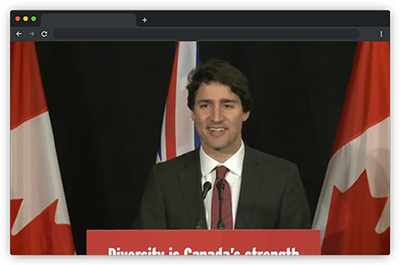
Your Instructor
Dom barnard.
Dom is Curriculum Lead for the Public Speaking course. He's an entrepreneur and engineer with a passion for finding new ways to improve speaking skills using technology. Previously, Dom worked at Jaguar Land Rover before leaving to start VirtualSpeech and now speaks at events around the world.
Practice exercises
Practice your public speaking with interactive and engaging exercises. At key points during the course, you'll be prompted to practice what you've learned in one of the following exercises.

Eye contact training
Improve your eye contact and connect with the audience. Gamification and heatmaps give you feedback on where you need to focus your eye contact.

Impromptu speech training
Practice quick-thinking and impromptu speaking by talking about a random slide every 30 seconds or answer random Table Topic questions.

Sound & visual distractions
It's easy to get distracted by the audience and venue. Learn how to deal with sound and visual distractions, including mobile phones ringing and bright lighting.

Giving a TEDx speech
Receive feedback on your TEDx speech in this large theatre, designed after a popular TEDx venue. Better understanding how your audience perceives you.

Literary techniques
Learn about key literary techniques you can use in your next speech or presentation.
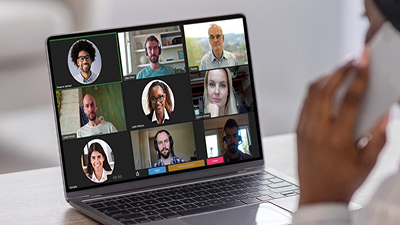
Video-based presentation
Practice how to deliver successful video-conferencing presentations on Zoom, Skype, Webex, Teams, and more.
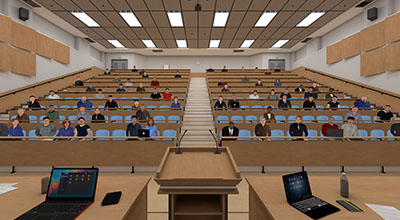
Lecture hall
Deliver a speech in this large lecture hall. Load slides and use the speech analysis feature to get feedback.

Conference presentation
Deliver a conference presentation to around 100 people in this popular training environment with a range of features.
Features in the practice exercises
Improve faster and practice what you learn with these features.
AI-powered questions
Upload slides and notes, speech analysis, audience distractions, listenability score, track progress, jordan brook, what's included in this course:.
- 5 hours of learning
- 6 case studies
- 8 practice exercises
- AI feedback and questions
- Quizzes and assessment
- Earn a digital course certificate
- Flexible, self-led format
- Access to updated content
CEU - Continuing Education Units

Continuing Professional Development (CPD)
CPD Credits / Hours: 5
Certificate No: A031338
This course
12 months access to this course
Pay in Euros
Access all courses
(per month), frequently asked questions.
You can access the classes through the VirtualSpeech website, on any standard web browser such as Chrome, Firefox, or Safari.
The practice exercises can be completed online or in virtual reality (if you have a VR headset).
When you enroll in the course, you'll get 24/7 access to the course (including tutorial videos, case studies, practice exercises, VR, and more) through the VirtualSpeech website and in VR.
Both the online classes and exercises run in your browser, no additional software or download is required.
If you have a VR headset, you can also access the practice exercises in VR. Here's a list of our recommended VR headsets .
The online exercises have been tested across multiple browsers and run smoothly on Google Chrome, Safari, Firefox, Internet Explorer, and Edge.
We accept payment via Credit Card, Debit Card or PayPal directly through the VirtualSpeech site. If you'd like to pay with an Invoice or using another payment method, please contact us.
Yes you can. After pressing the 'Buy Now' button on this page, select the number of users (maximum is 25).
After the payment, you'll be made course admin and can add users to the course from the admin dashboard.
Yes, when you've completed this course, we'll send you a Certificate of Achievement, which you can share in the Certifications section of your LinkedIn profile, on printed resumes, CVs, or other documents.
If the course does not meet your expectations, you can get a full refund within 7 days of purchasing the course.
Rhetoric: The Art of Persuasive Writing and Public Speaking
Gain critical communication skills in writing and public speaking with this introduction to American political rhetoric.

Associated Schools

Harvard Faculty of Arts & Sciences
What you'll learn.
When and how to employ a variety of rhetorical devices in writing and speaking
How to differentiate between argument and rhetorical technique
How to write a persuasive opinion editorial and short speech
How to evaluate the strength of an argument
How to identify logical fallacies in arguments
Course description
We are living in a contentious time in history. Fundamental disagreements on critical political issues make it essential to learn how to make an argument and analyze the arguments of others. This ability will help you engage in civil discourse and make effective changes in society. Even outside the political sphere, conveying a convincing message can benefit you throughout your personal, public, and professional lives.
This course is an introduction to the theory and practice of rhetoric, the art of persuasive writing and speech. In it, you will learn to construct and defend compelling arguments, an essential skill in many settings. We will be using selected addresses from prominent twentieth-century Americans — including Martin Luther King Jr., John F. Kennedy, Margaret Chase Smith, Ronald Reagan, and more — to explore and analyze rhetorical structure and style. Through this analysis, you will learn how speakers and writers persuade an audience to adopt their point of view.
Built around Harvard Professor James Engell’s on-campus course, “Elements of Rhetoric,” this course will help you analyze and apply rhetorical structure and style, appreciate the relevance of persuasive communication in your own life, and understand how to persuade and recognize when someone is trying to persuade you. You will be inspired to share your viewpoint and discover the most powerful ways to convince others to champion your cause. Join us to find your voice!
Course Outline
Introduction to Rhetoric
- Define the term "rhetoric."
- Articulate the importance of effective communication.
- Summarize the history of rhetorical study, from the ancient Greeks to the modern-day.
- Identify the parts of discourse.
- Define the three modes of appeal.
- Identify tropes and schemes, and explain their use in composition.
- Compose an opinion editorial on a topic of your choice.
Civil Rights - Martin Luther King, Jr.
- Analyze Martin Luther King, Jr.’s “I Have a Dream…” speech
- Define inductive reasoning and some of its associated topics
- Identify instances of inductive reasoning in writing and speech
- Define deductive reasoning and some of its associated topics
- Identify instances of deductive reasoning in writing and speech
- Recognize and evaluate the strength of an argument's refutation
- Apply the elements of rhetoric you have learned so far into the final draft of your op-ed
Gun Control - Sarah Brady and Charlton Heston
- Analyze Sarah Brady’s Democratic National Convention Keynote Speech.
- Analyze Charlton Heston’s speech on the Second Amendment.
- Define “inductive reasoning” and some of its associated topics
- Define “deductive reasoning” and some of its associated topics
- Recognize and evaluate the strength of an argument’s refutation
- Apply the elements of rhetoric you have learned so far in the final draft of your op-ed
Introduction to Oratory
- Describe the origins of the practice of oratory.
- Recognize ways in which orators tailor their writing for the spoken word.
- Describe techniques for effective public speaking, both prepared and extemporaneous.
- Brainstorm ideas for your own short speech.
The Red Scare - Joseph McCarthy and Margaret Chase Smith
- Analyze Joseph McCarthy’s “Enemies Within” speech.
- Analyze Margaret Chase Smith’s "A Declaration of Conscience" speech.
- Identify the modes of appeal and the logical reasoning of the featured speeches.
- Identify both common and special topics used in these speeches, like cause and effect, testimony, justice and injustice, and comparison, and begin to recognize their use in other speeches.
- Identify examples from these speeches of logical fallacies including the either/or fallacy, the fallacy of affirming the consequent, the argument ad hominem, the argument ad populum, begging the question, the complex question, and the use of imprecise language.
- Discuss the importance of winning and keeping an audience’s trust and the pros and cons of attempting to tear down their confidence in an opponent.
- Define for yourself the definition of "extremist rhetoric," debate its use as a political tool.
- Consider the moral responsibilities of those who would seek to persuade others through language.
Presidential Rhetoric - John F. Kennedy and Ronald Reagan
- Discuss how the audience and the desired tone for a speech can influence diction (word choice).
- Compare the effects of using passive vs. active voice, and first-person vs. other tenses in a speech.
- Discuss the effectiveness of the use of symbolism in writing and speech.
- Define hyperbole, antimetabole, and polysyndeton, and identify when these devices might be appropriate and useful in terms of persuasion.
- Describe techniques for connecting with your audience, including storytelling and drawing on shared experience.
Instructors
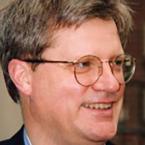
James Engell
You may also like.

Effective Writing for Health Care
This Harvard Medical School one-year, application-based certificate program is designed to help clinicians, researchers and allied health professionals achieve their writing career goals.

Modern Masterpieces of World Literature
Examine how great modern writers capture the intricacies of our globalized world and how their works circulate within that world to find their own audiences.

Masterpieces of World Literature
Embark on a global journey to explore the past, present, and future of world literature.
DPI-835M: Speechwriting
In this section.
- Courses related to climate
- Course Registration
- Courses related to racism & bias
- Cross-Registration & Auditing

Stephen Krupin

MaryRose Mazzola
What makes a speech persuasive and memorable – and how do you write one? How can storytelling help political, corporate, nonprofit, and community leaders achieve their goals? What is the role of the speech in our politics, policymaking, and international relations? This course will explore the techniques speechwriters and speakers use, from research to rhetoric, to shape messages that move people and change the world.
Each course in the DPI communications series assumes a fluency with the English language. Attendance at first class mandatory.
Writing a speech
Topic outline.
The purpose of a speech is often to inform or persuade an audience.
Speeches are usually written to be spoken directly to an audience and can be used to entertain, influencing the listeners that the viewpoint of the speaker is correct.
Speeches can also be used to encourage the audience to take action or to change their behaviour in some way; for example, to join a particular school club or society, or to recycle more.
The ways you use language and vocabulary when writing the words of a speech will depend on the audience and the purpose you are writing for; for example, in a speech to a group of teachers and parents giving your views on a recent proposal, formal language is most appropriate.
- think about the audience that the speech is for – are you giving your speech to a group of people you know, or do not know, or a mixture of both? If you know your audience well, you may be able to relax a little, but a speech is still a formal kind of talk and would usually not include slang
- whether your audience are likely to disagree with what you say – you will need to consider any possible objections and deal with them. Use language carefully to make objections seem less significant; for example, using phrases like ‘A few people may still think, however’
- the reason you are giving this speech and how you feel about this topic – try to imagine the words of your speech as you would speak them out loud. Your tone of voice must match your message, so choose words that appeal to the emotions of your listeners. Focus on what you want your audience to know and feel by the end of your speech
- how to engage your listeners – f or example, you might use inclusive words or phrases like ‘we’, ‘all of us’ and ‘our’ to make your listeners feel that you are all on the same side.
- Plan where you want to finish your speech and how you will get there before you start writing – t h e structure of a speech is usually in three parts. For example:
- An opening that grabs your audience's attention and makes the overall topic of your speech clear – for example, pose a question to the audience where you can predict the answer.
- A well-structured, supported and developed argument – for example, to support your argument you might use real life examples or anecdotes.
- A powerful conclusion – for example, group your final words or ideas in threes to help make them memorable or end with a thought- provoking question or image and thank your audience for listening.
- Organise your ideas into paragraphs as appropriate – this will help you to develop and support your points convincingly, to build your argument and/or offer a full explanation of a particular point of view.
- S how the connectio ns between ideas in sentences and paragraphs – where a new point or idea follows on from what you have already said you might use linking words or phrases such as, ‘in addition’, ‘likewise’ or ‘similarly’.
- Example of a speech
Columbia cancels in-person classes; protesters arrested at Yale and NYU: Updates
Editor's Note: This page is a summary of news on student protests engulfing campuses over the Israel-Hamas war on Monday, April 22. For the latest news, see our live updates file for Tuesday, April 23 .
NEW YORK – As tensions over the Israel-Hamas war continue to boil on campuses across the country, Columbia University on Monday moved classes online while dozens of students were arrested in protests at Yale and New York University, and school officials closed Harvard Yard to the public.
Demonstrations at Yale and Harvard were planned in part out of solidarity with protesters at Columbia who set up an encampment last week that led to the arrest of more than 100 students. The protests have raised concerns for the safety of Jewish students and fueled a national debate over student demonstrations as campuses grapple with growing unrest over the war in Gaza.
At New York University, officers moved on the NYU crowd shortly after nightfall as hundreds of demonstrators for hours had defied university warnings that they faced consequences if they failed to vacate a plaza where they had established a Gaza Solidarity Encampment.
Video on social media showed police taking down tents in the protesters' NYU encampment. Demonstrators tussled with officers and chanted, "We will not stop, we will not rest. Disclose. Divest."
A New York police spokesperson said arrests were made after NYU asked police to enforce trespassing violations but the total number of arrests and citations are still unknown.
Columbia President Minouche Shafik said in a statement Monday that while online classes are being held, a working group of deans, university administrators and faculty members "will try to bring this crisis to a resolution" by, among other actions, speaking with student protesters.
Most classes at Columbia will be hybrid for the rest of the spring semester, the university announced Monday, as students grapple with tensions over the war. All courses on the college’s Morningside main campus will be hybrid, the college said, except for art or practice-based programs. The Medical Center and Manhattanville will also remain in-person.
“Safety is our highest priority as we strive to support our students’ learning and all the required academic operations,” the provost's office said in a statement.
Columbia is the latest U.S. school to be rocked by the Israel-Hamas war, which began with Hamas' brutal border attacks on Israeli communities Oct. 7. Israel's subsequent bombardment of Gaza has led to a dire humanitarian crisis there and fueled protests nationwide demanding a cease-fire.
As demonstrations have proliferated across college campuses, students have also been demanding that universities show more transparency in their investments and divest from enterprises with links to Israel's war effort.
Protests continue on both sides amid police presence
Demonstrators on both sides of the dispute met student protesters outside Columbia's gates Monday morning, banging drums, carrying signs and flags and chanting.
About a dozen pro-Palestinian protesters shouted: “Resistance is justified when people face genocide. Resistance is justified when people are colonized.”
After a few minutes, officers with the New York Police Department told the group not to bang the drum. A USA TODAY reporter saw police handcuff two pro-Palestinian protesters and walk them toward NYPD vehicles.
The NYPD told USA TODAY that as of early afternoon it had no record of arrests or people being taken into custody outside the school. The department said the most recent arrest was Saturday.
How Columbia University became the epicenter of disagreement over the Israel-Hamas war
Patriots owner Robert Kraft says he has 'lost faith' in alma mater Columbia
New England Patriots owner Robert Kraft, a prominent Columbia alumnus and donor, said Monday he has "lost faith in the institution'' and no longer recognizes it.
In a social media post from his Foundation to Combat Antisemitism , Kraft called for the university to stop the protests that have roiled the campus and led to some tense confrontations between pro-Palestinian demonstrators and Jewish students.
"I am deeply saddened at the virulent hate that continues to grow on campus and throughout our country,'' said Kraft, who is Jewish. "I am no longer confident that Columbia can protect its students and staff and I am not comfortable supporting the university until corrective action is taken.''
The billionaire businessman referred to Columbia, from where he graduated in 1963, as "the school I love so much.'' He has demonstrated that with millions of dollars in donations, some of which helped fund the Kraft Center for Jewish Student Life at the school.
Kraft closed his statement saying he hopes the center "will serve as a source of security and safety for all Jewish students and faculty on campus who want to gather peacefully to practice their religion, to be together, and to be welcomed.''
Jewish Columbia faculty member says he was denied entry
Shai Davidai, an assistant professor of business at Columbia, spoke out against the school from its front gates after he said he was denied entry onto campus Monday morning.
“They have deactivated my card, they are not letting me, a Jewish professor at Columbia, they are not letting me on campus,” he said.
Davidai told a crowd gathered outside that he was not given prior notice his entry card would be deactivated and that later the university told him he would be allowed on the business campus to teach Tuesday.
On the social media platform X, Davidai wrote: “Earlier today, @Columbia University refused to let me onto campus. Why? Because they cannot protect my safety as a Jewish professor. This is 1938.”
At a news conference, Michael Gerber, deputy commissioner of legal matters for the NYPD, said the city had nothing to do with the decision to deny Davidai entry onto campus. “They’re doing their own analysis, making their own decisions, making their own safety determinations,” he said. “That’s not us.”
The university did not immediately respond to a request for comment.
Protesters arrested at Yale University
Dozens of students were arrested at Yale University on Monday as police cleared an encampment set up by students in protest of the war in Gaza.
A statement from the university said at least 47 students had been arrested as of 9:50 a.m. ET. The latest police action against students protesting the war came as the Yale encampment, set up last week, grew to include several hundred people calling on the university to drop investments to military weapons manufacturers.
Negotiations between the protesters and university officials ended unsuccessfully late Sunday night, the university said. Early Monday morning, campus police asked the protesters to leave Beinecke Plaza, the university's main lawn, remove their belongings and show their IDs. When some refused, the arrests began.
"The university made the decision to arrest those individuals who would not leave the plaza with the safety and security of the entire Yale community in mind and to allow access to university facilities by all members of our community," the statement said.
After the encampment was cleared, hundreds of protesters blocked nearby streets and were heard chanting, “We will free Palestine within our lifetime,” according to the Yale Daily News .
Harvard University closes part of campus to the public
Harvard has closed its main lawn to the public in anticipation of pro-Palestinian protests following the recent uproar at Columbia.
A written announcement posted on the entrance gates said disciplinary actions would be taken against Harvard students who bring into the area unauthorized structures such as tents or tables, according to the Harvard Crimson . The closure was decided “out of an abundance of caution and with the safety of our community as a priority," according to an email received by students. The student newspaper also reported the school's Palestine Solidarity Committee has been suspended .
On Friday, over 200 students and others took to Harvard Yard in solidarity with the protesters at Columbia and demanded that the Ivy League school also divest from Israel-related investments, the student newspaper reported.
Students at other Boston-area colleges, like MIT, Tufts and Emerson, have begun their own solidarity encampments, and the movement has also expanded to other prominent universities like Cal-Berkeley and Michigan.
Cal-Berkeley students also set up camp, demand school divest holdings
Several hundred students gathered around noon Monday in front of the Sproul Hall administration building on the University of California campus at Berkeley.
They set up about a dozen tents and said they plan to stay on site until the university system divests its financial holdings from corporations that "enable profit from Israeli apartheid, occupation and genocide in accordance with the international boycott, divestment and sanctions movement," said Banan Abdelrahman, a leader with the group UC Berkeley Graduate Students for Justice in Palestine.
She and others called for an immediate end to the violence in Gaza and to permanently sever ties with Israeli universities, including the Berkeley Summer Global Internship Program Israel.
Students want to enact policies to protect the safety and academic freedoms of Palestinian, Arab, Muslim and other students and faculty who have faced blacklisting, harassment, threats and the unwanted publication of private information, Abdelrahman said. "We will be here all day and all night," she said.
UC Berkeley spokesperson Dan Mogulof said there are no plans to change the university's investment policies and practices.
− Terry Collins
Why are students protesting at Columbia?
Last week, more than 100 student protesters were arrested and suspended after Shafik called in the NYPD to clear an encampment on the campus' South Lawn. The “Gaza Solidarity Encampment" was set up by Columbia University Apartheid Divest, a coalition of student organizations calling for the school "to divest all economic and academic stakes in Israel," according to its website.
Administrators closed campus to those without campus IDs, though protests continued both on the main lawn and outside the campus gates through the weekend. Several more people were arrested, multiple outlets reported. On Sunday, the school announced new safety measures including doubling the number of security personnel and improved identification checks at campus entry points. But tensions continued to boil.
Rabbi Elie Buechler , director of the Orthodox Union-Jewish Learning Initiative on Campus at Columbia and the all-women’s Barnard, told students to "return home as soon as possible," saying the protests have endangered their safety.
In her decision to order all classes to be moved online, Shafik cited "intimidating and harassing behavior on our campus" and the use of antisemitic language. Videos of the protests have shown tense stand-offs between people holding Israeli flags and the pro-Palestinian protesters.
Students are on 'the right side of history'
Outside of Columbia's gates near 115th street in New York, pro-Palestinian protesters gathered on one side chanting with students inside the campus. Pro-Israeli protesters grouped on the other.
Tahia Islam, an organizer with Shut it Down For Palestine, said the coalition has been working and communicating with students in the encampment, where she said they have created a community of "safety and care."
"They are putting so much of their lives, their careers at risk because they know that the real struggle and the real school is in this moment, right now. It's not in what's getting (taught) in these ivory towers," she said. "They're part of a historical legacy of student movements ... they're absolutely on the right side of history and we'll be with them every step of the way."
Columbia student Hector Lionel took issue with the university's messaging that the students in the encampment were disrupting his studies. The closed gates with ID checkpoints are a bigger hassle than the tents, he said.
"It's just gotten too dystopian," Lionel said. "Now we need to defend the right to protest."
New York governor meets with Columbia University president
New York Gov. Kathy Hochul, a Democrat, met with Shafik on Monday morning to discuss the security situation on the school’s Manhattan campus. In a video posted on X , Hochul underscored the need to ensure students and faculty have the right to peacefully protest while also upholding human rights laws.
“The recent harassment and rhetoric is vile and abhorrent,” Hochul wrote in a social media post. “Every student deserves to be safe.”
The meeting came after New York City Mayor Eric Adams, a former police officer, condemned the situation Sunday, and promised that any demonstrators around campus found to be in violation of laws would be arrested.
“We will not be a city of lawlessness, and those professional agitators seeking to seize the ongoing conflict in the Middle East to sow chaos and division will not succeed,” he wrote on X, drawing praise from the Israeli consulate in New York.
– Zachary Schermele
President Biden responds to 'alarming surge of antisemitism'
Following days of escalating protests at several major universities across the country, President Joe Biden urged Americans to speak out against an “alarming surge of antisemitism” in the U.S.
"Silence is complicity," Biden said in a written statement Sunday night. "Even in recent days, we’ve seen harassment and calls for violence against Jews. This blatant antisemitism is reprehensible and dangerous – and it has absolutely no place on college campuses, or anywhere in our country.''
Biden also expressed his wishes for a happy Passover, the Jewish holiday that begins Monday evening. "This year, let us remember the central Passover theme that even in the darkest of times, the promise of God’s protection will give us strength to find hope, resilience, and redemption," Biden said.
Biden also said his administration will continue work to implement the National Strategy to Counter Antisemitism it announced last May.
– Rachel Barber and Joey Garrison
Faculty, alumni gather outside Columbia campus
Alumni, faculty and parents gathered outside Columbia on Monday, some out of concern for what they say is rising antisemitism on campus and others in support of the students protesting the war.
Amy Werman, a professor with Columbia’s School of Social Work, told USA TODAY, “We are here to show that we have a place on this campus and we belong here and we're not going to be intimidated."
Harriet Jackson, who works at the Columbia Teacher’s College, said she's worried about Jewish students, faculty and staff feeling protected, adding that she believes in protesting and would describe herself as "pro-Palestinian and against any kind of oppression of any people."
House Republicans call for Columbia president’s resignation
Two conservative New York congresswomen called for Shafik’s resignation over the weekend, even as their colleagues in the House – as well as some local Republicans – stopped short of the same demand.
Rep. Elise Stefanik, whose viral questioning of the presidents of Harvard and the University of Pennsylvania ultimately helped spur their exits, said Sunday that Shafik has “clearly lost control,” putting the safety of Jewish students at risk.
“It is crystal clear that Columbia University – previously a beacon of academic excellence founded by Alexander Hamilton – needs new leadership,” she wrote in a post on X . The school was actually chartered by King George II.
Rep. Nicole Malliotakis, a Republican representing parts of Brooklyn and Staten Island, said Monday that the school’s abrupt pivot to virtual learning was proof that Shafik has been “unable to stop the antisemitic activity on her campus.”
Congressional Democrats also condemned reports of antisemitic incidents and the souring campus climate, though many stopped short of calling for Shafik to step down. Several Jewish Democrats planned to visit the school Monday to speak with students.
Alumni support protesters with supplies
Among those trying to get inside of Columbia’s gates were alumni supporting the student encampment with supplies.
Olivia Baker, who graduated last year from Columbia, was trying to deliver food and electrolyte drinks to students. Baker, whose grandfather is a Holocaust survivor, was denied entry to campus despite having an ID.
Baker has been in contact with other alums who are supplying food to students as well. “It’s great to feel connected to this community,” Baker said. “Maybe not to the school and its policies and leadership, but to the alumni community and the kids who are showing out and changing things.”
- Share full article
For more audio journalism and storytelling, download New York Times Audio , a new iOS app available for news subscribers.
The Crackdown on Student Protesters
Columbia university is at the center of a growing showdown over the war in gaza and the limits of free speech..
This transcript was created using speech recognition software. While it has been reviewed by human transcribers, it may contain errors. Please review the episode audio before quoting from this transcript and email [email protected] with any questions.
[TRAIN SCREECHING]
Well, you can hear the helicopter circling. This is Asthaa Chaturvedi. I’m a producer with “The Daily.” Just walked out of the 116 Street Station. It’s the main station for Columbia’s Morningside Heights campus. And it’s day seven of the Gaza solidarity encampment, where a hundred students were arrested last Thursday.
So on one side of Broadway, you see camera crews. You see NYPD officers all lined up. There’s barricades, steel barricades, caution tape. This is normally a completely open campus. And I’m able to — all members of the public, you’re able to walk through.
[NON-ENGLISH SPEECH]
Looks like international media is here.
Have your IDs out. Have your IDs out.
Students lining up to swipe in to get access to the University. ID required for entry.
Swipe your ID, please.
Hi, how are you, officer? We’re journalists with “The New York Times.”
You’re not going to get in, all right? I’m sorry.
Hi. Can I help please?
Yeah, it’s total lockdown here at Columbia.
Please have your IDs out ready to swipe.
From “The New York Times,” I’m Michael Barbaro. This is “The Daily.” Today, the story of how Columbia University has become the epicenter of a growing showdown between student protesters, college administrators, and Congress over the war in Gaza and the limits of free speech. I spoke with my colleague, Nick Fandos.
[UPBEAT MUSIC]
It’s Thursday, April 25.
Nick, if we rewind the clock a few months, we end up at a moment where students at several of the country’s best known universities are protesting Israel’s response to the October 7 attacks, its approach to a war in Gaza. At times, those protests are happening peacefully, at times with rhetoric that is inflammatory. And the result is that the leaders of those universities land before Congress. But the president of Columbia University, which is the subject we’re going to be talking about today, is not one of the leaders who shows up for that testimony.
That’s right. So the House Education Committee has been watching all these protests on campus. And the Republican Chairwoman decides, I’m going to open an investigation, look at how these administrations are handling it, because it doesn’t look good from where I sit. And the House last winter invites the leaders of several of these elite schools, Harvard, Penn, MIT, and Columbia, to come and testify in Washington on Capitol Hill before Congress.
Now, the President of Columbia has what turns out to be a very well-timed, pre-planned trip to go overseas and speak at an international climate conference. So Minouche Shafik isn’t going to be there. So instead, the presidents of Harvard, and Penn, and MIT show up. And it turned out to be a disaster for these universities.
They were asked very pointed questions about the kind of speech taking place on their campuses, and they gave really convoluted academic answers back that just baffled the committee. But there was one question that really embodied the kind of disconnect between the Committee — And it wasn’t just Republicans, Republicans and Democrats on the Committee — and these college presidents. And that’s when they were asked a hypothetical.
Does calling for the genocide of Jews violate Penn’s rules or code of conduct? Yes or no?
If the speech turns into conduct, it can be harassment.
And two of the presidents, Claudine Gay of Harvard and Elizabeth Magill of the University of Pennsylvania, they’re unwilling to say in this really kind of intense back and forth that this speech would constitute a violation of their rules.
It can be, depending on the context.
What’s the context?
Targeted at an individual. Is it pervasive?
It’s targeted at Jewish students, Jewish individuals. Do you understand your testimony is dehumanizing them?
And it sets off a firestorm.
It does not depend on the context. The answer is yes. And this is why you should resign. These are unacceptable answers across the board.
Members of Congress start calling for their resignations. Alumni are really, really ticked off. Trustees of the University start to wonder, I don’t know that these leaders really have got this under control. And eventually, both of them lose their jobs in a really high profile way.
Right. And as you’ve hinted at, for somewhat peculiar scheduling reasons, Columbia’s President escapes this disaster of a hearing in what has to be regarded as the best timing in the history of the American Academy.
Yeah, exactly. And Columbia is watching all this play out. And I think their first response was relief that she was not in that chair, but also a recognition that, sooner or later, their turn was going to come back around and they were going to have to sit before Congress.
Why were they so certain that they would probably end up before Congress and that this wasn’t a case of completely dodging a bullet?
Well, they remain under investigation by the committee. But also, as the winter wears on, all the same intense protests just continue unabated. So in many ways, Columbia’s like these other campuses. But in some ways, it’s even more intense. This is a university that has both one of the largest Jewish student populations of any of its peers. But it also has a large Arab and Muslim student population, a big Middle Eastern studies program. It has a dual degree program in Tel Aviv.
And it’s a university on top of all that that has a real history of activism dating back to the 1960s. So when students are recruited or choose to come to Columbia, they’re actively opting into a campus that prides itself on being an activist community. It’s in the middle of New York City. It’s a global place. They consider the city and the world, really, like a classroom to Columbia.
In other words, if any campus was going to be a hotbed of protest and debate over this conflict, it was going to be Columbia University.
Exactly. And when this spring rolls around, the stars finally align. And the same congressional committee issues another invitation to Minouche Shafik, Columbia’s President, to come and testify. And this time, she has no excuse to say no.
But presumably, she is well aware of exactly what testifying before this committee entails and is highly prepared.
Columbia knew this moment was coming. They spent months preparing for this hearing. They brought in outside consultants, crisis communicators, experts on anti-Semitism. The weekend before the hearing, she actually travels down to Washington to hole up in a war room, where she starts preparing her testimony with mock questioners and testy exchanges to prep her for this. And she’s very clear on what she wants to try to do.
Where her counterparts had gone before the committee a few months before and looked aloof, she wanted to project humility and competence, to say, I know that there’s an issue on my campus right now with some of these protests veering off into anti-Semitic incidents. But I’m getting that under control. I’m taking steps in good faith to make sure that we restore order to this campus, while allowing people to express themselves freely as well.
So then the day of her actual testimony arrives. And just walk us through how it goes.
The Committee on Education and Workforce will come to order. I note that —
So Wednesday morning rolls around. And President Shafik sits at the witness stand with two of her trustees and the head of Columbia’s new anti-Semitism task force.
Columbia stands guilty of gross negligence at best and at worst has become a platform for those supporting terrorism and violence against the Jewish people.
And right off the bat, they’re put through a pretty humbling litany of some of the worst hits of what’s been happening on campus.
For example, just four days after the harrowing October 7 attack, a former Columbia undergraduate beat an Israeli student with a stick.
The Republican Chairwoman of the Committee, Virginia Foxx, starts reminding her that there was a student who was actually hit with a stick on campus. There was another gathering more recently glorifying Hamas and other terrorist organizations, and the kind of chants that have become an everyday chorus on campus, which many Jewish students see as threatening. But when the questioning starts, President Shafik is ready. One of the first ones she gets is the one that tripped up her colleagues.
Does calling for the genocide of Jews violate Columbia’s code of conduct, Mr. Greenwald?
And she answers unequivocally.
Dr. Shafik?
Yes, it does.
And, Professor —
That would be a violation of Columbia’s rules. They would be punished.
As President of Columbia, what is it like when you hear chants like, by any means necessary or Intifada Revolution?
I find those chants incredibly distressing. And I wish profoundly that people would not use them on our campus.
And in some of the most interesting exchanges of the hearing, President Shafik actually opens Columbia’s disciplinary books.
We have already suspended 15 students from Columbia. We have six on disciplinary probation. These are more disciplinary actions that have been taken probably in the last decade at Columbia. And —
She talks about the number of students that have been suspended, but also the number of faculty that she’s had removed from the classroom that are being investigated for comments that either violate some of Columbia’s rules or make students uncomfortable. One case in particular really underscores this.
And that’s of a Middle Eastern studies professor named Joseph Massad. He wrote an essay not long after Hamas invaded Israel and killed 1,200 people, according to the Israeli government, where he described that attack with adjectives like awesome. Now, he said they’ve been misinterpreted, but a lot of people have taken offense to those comments.
Ms. Stefanik, you’re recognized for five minutes.
Thank you, Chairwoman. I want to follow up on my colleague, Rep Walberg’s question regarding Professor Joseph Massad. So let me be clear, President —
And so Representative Elise Stefanik, the same Republican who had tripped up Claudine Gay of Harvard and others in the last hearing, really starts digging in to President Shafik about these things at Columbia.
He is still Chair on the website. So has he been terminated as Chair?
Congresswoman, I —
And Shafik’s answers are maybe a little surprising.
— before getting back to you. I can confirm —
I know you confirmed that he was under investigation.
Yes, I can confirm that. But I —
Did you confirm he was still the Chair?
He says that Columbia is taking his case seriously. In fact, he’s under investigation right now.
Well, let me ask you this.
I need to check.
Will you make the commitment to remove him as Chair?
And when Stefanik presses her to commit to removing him from a campus leadership position —
I think that would be — I think — I would — yes. Let me come back with yes. But I think I — I just want to confirm his current status before I write —
We’ll take that as a yes, that you will confirm that he will no longer be chair.
Shafik seems to pause and think and then agree to it on the spot, almost like she is making administrative decisions with or in front of Congress.
Now, we did some reporting after the fact. And it turns out the Professor didn’t even realize he was under investigation. So he’s learning about this from the hearing too. So what this all adds up to, I think, is a performance so in line with what the lawmakers themselves wanted to hear, that at certain points, these Republicans didn’t quite know what to do with it. They were like the dog that caught the car.
Columbia beats Harvard and UPenn.
One of them, a Republican from Florida, I think at one point even marvelled, well, you beat Harvard and Penn.
Y’all all have done something that they weren’t able to do. You’ve been able to condemn anti-Semitism without using the phrase, it depends on the context. But the —
So Columbia’s president has passed this test before this committee.
Yeah, this big moment that tripped up her predecessors and cost them their jobs, it seems like she has cleared that hurdle and dispatched with the Congressional committee that could have been one of the biggest threats to her presidency.
Without objection, there being no further business, the committee stands adjourned. [BANGS GAVEL]
But back on campus, some of the students and faculty who had been watching the hearing came away with a very different set of conclusions. They saw a president who was so eager to please Republicans in Congress that she was willing to sell out some of the University’s students and faculty and trample on cherished ideas like academic freedom and freedom of expression that have been a bedrock of American higher education for a really long time.
And there was no clearer embodiment of that than what had happened that morning just as President Shafik was going to testify before Congress. A group of students before dawn set up tents in the middle of Columbia’s campus and declared themselves a pro-Palestinian encampment in open defiance of the very rules that Dr. Shafik had put in place to try and get these protests under control.
So these students in real-time are beginning to test some of the things that Columbia’s president has just said before Congress.
Exactly. And so instead of going to celebrate her successful appearance before Congress, Shafik walks out of the hearing room and gets in a black SUV to go right back to that war room, where she’s immediately confronted with a major dilemma. It basically boils down to this, she had just gone before Congress and told them, I’m going to get tough on these protests. And here they were. So either she gets tough and risks inflaming tension on campus or she holds back and does nothing and her words before Congress immediately look hollow.
And what does she decide?
So for the next 24 hours, she tries to negotiate off ramps. She consults with her Deans and the New York Police Department. And it all builds towards an incredibly consequential decision. And that is, for the first time in decades, to call the New York City Police Department onto campus in riot gear and break this thing up, suspend the students involved, and then arrest them.
To essentially eliminate this encampment.
Eliminate the encampment and send a message, this is not going to be tolerated. But in trying to quell the unrest, Shafik actually feeds it. She ends up leaving student protesters and the faculty who support them feeling betrayed and pushes a campus that was already on edge into a full blown crisis.
[SLOW TEMPO MUSIC]
After the break, what all of this has looked like to a student on Columbia’s campus. We’ll be right back.
[PHONE RINGS]
Is this Isabella?
Yes, this is she.
Hi, Isabella. It’s Michael Barbaro from “The Daily.”
Hi. Nice to meet you.
Earlier this week, we called Isabella Ramírez, the Editor in Chief of Columbia’s undergraduate newspaper, “The Columbia Daily Spectator,” which has been closely tracking both the protests and the University’s response to them since October 7.
So, I mean, in your mind, how do we get to this point? I wonder if you can just briefly describe the key moments that bring us to where we are right now.
Sure. Since October 7, there has certainly been constant escalation in terms of tension on campus. And there have been a variety of moves that I believe have distanced the student body, the faculty, from the University and its administration, specifically the suspension of Columbia’s chapters of Students for Justice in Palestine and Jewish Voice for Peace. And that became a huge moment in what was characterized as suppression of pro-Palestinian activism on campus, effectively rendering those groups, quote, unquote, unauthorized.
What was the college’s explanation for that?
They had cited in that suspension a policy which states that a demonstration must be approved within a certain window, and that there must be an advance notice, and that there’s a process for getting an authorized demonstration. But the primary point was this policy that they were referring to, which we later reported, was changed before the suspension.
So it felt a little ad hoc to people?
Yes, it certainly came as a surprise, especially at “Spectator.” We’re nerds of the University in the sense that we are familiar with faculty and University governance. But even to us, we had no idea where this policy was coming from. And this suspension was really the first time that it entered most students’ sphere.
Columbia’s campus is so known for its activism. And so in my time of being a reporter, of being an editor, I’ve overseen several protests. And I’ve never seen Columbia penalize a group for, quote, unquote, not authorizing a protest. So that was certainly, in our minds, unprecedented.
And I believe part of the justification there was, well, this is a different time. And I think that is a reasonable thing to say. But I think a lot of students, they felt it was particularly one-sided, that it was targeting a specific type of speech or a specific type of viewpoint. Although, the University, of course, in its explicit policies, did not outline, and was actually very explicit about not targeting specific viewpoints —
So just to be super clear, it felt to students — and it sounds like, journalistically, it felt to you — that the University was coming down in a uniquely one-sided way against students who were supporting Palestinian rights and may have expressed some frustrations with Israel in that moment.
Yes. Certainly —
Isabella says that this was just the beginning of a really tense period between student protesters and the University. After those two student groups were suspended, campus protests continued. Students made a variety of demands. They asked that the University divest from businesses that profit from Israel’s military operations in Gaza. But instead of making any progress, the protests are met with further crackdown by the University.
And so as Isabella and her colleagues at the college newspaper see it, there’s this overall chilling effect that occurs. Some students become fearful that if they participate in any demonstrations, they’re going to face disciplinary action. So fast forward now to April, when these student protesters learned that President Shafik is headed to Washington for her congressional testimony. It’s at this moment that they set out to build their encampment.
I think there was obviously a lot of intention in timing those two things. I think it’s inherently a critique on a political pressure and this congressional pressure that we saw build up against, of course, Claudine Gay at Harvard and Magill at UPenn. So I think a lot of students and faculty have been frustrated at this idea that there are not only powers at the University that are dictating what’s happening, but there are perhaps external powers that are also guiding the way here in terms of what the University feels like it must do or has to do.
And I think that timing was super crucial. Having the encampment happen on the Wednesday morning of the hearing was an incredible, in some senses, interesting strategy to direct eyes to different places.
All eyes were going to be on Shafik in DC. But now a lot of eyes are on New York. The encampment is set up in the middle of the night slash morning, prior to the hearing. And so what effectively happens is they caught Shafik when she wasn’t on campus, when a lot of senior administration had their resources dedicated to supporting Shafik in DC.
And you have all of those people not necessarily out of commission, but with their focus elsewhere. So the encampment is met with very little resistance at the beginning. There were public safety officers floating around and watching. But at the very beginning hours, I think there was a sense of, we did it.
[CHANTING]: Disclose! Divest! We will not stop! We will not rest. Disclose! Divest! We will not stop!
It would be quite surprising to anybody and an administrator to now suddenly see dozens of tents on this lawn in a way that I think very purposely puts an imagery of, we’re here to stay. As the morning evolved and congressional hearings continued —
Minouche Shafik, open your eyes! Use of force, genocide!
Then we started seeing University delegates that were coming to the encampment saying, you may face disciplinary action for continuing to be here. I think that started around almost — like 9:00 or 10:00 AM, they started handing out these code of conduct violation notices.
Hell no! Hell no! Hell no!
Then there started to be more public safety action and presence. So they started barricading the entrances. The day progressed, there was more threat of discipline. The students became informed that if they continue to stay, they will face potential academic sanctions, potential suspension.
The more they try to silence us, the louder we will be! The more they —
I think a lot of people were like, OK, you’re threatening us with suspension. But so what?
This is about these systems that Minouche Shafik, that the Board of Trustees, that Columbia University is complicit in.
What are you going to do to try to get us out of here? And that was, obviously, promptly answered.
This is the New York State Police Department.
We will not stop!
You are attempting participate in an unauthorized encampment. You will be arrested and charged with trespassing.
My phone blew up, obviously, from the reporters, from the editors, of saying, oh my god, the NYPD is on our campus. And as soon as I saw that, I came out. And I saw a huge crowd of students and affiliates on campus watching the lawns. And as I circled around that crowd, I saw the last end of the New York Police Department pulling away protesters and clearing out the last of the encampment.
[CHANTING]: We love you! We will get justice for you! We see you! We love you! We will get justice for you! We see you! We love you! We will get justice for you! We see you! We love you! We will get justice for you!
It was something truly unimaginable, over 100 students slash other individuals are arrested from our campus, forcefully removed. And although they were suspended, there was a feeling of traumatic event that has just happened to these students, but also this sense of like, OK, the worst of the worst that could have happened to us just happened.
And for those students who maybe couldn’t go back to — into campus, now all of their peers, who were supporters or are in solidarity, are — in some sense, it’s further emboldened. They’re now not just sitting on the lawns for a pro-Palestinian cause, but also for the students, who have endured quite a lot.
So the crackdown, sought by the president and enforced by the NYPD, ends up, you’re saying, becoming a galvanizing force for a broader group of Columbia students than were originally drawn to the idea of ever showing up on the center of campus and protesting?
Yeah, I can certainly speak to the fact that I’ve seen my own peers, friends, or even acquaintances, who weren’t necessarily previously very involved in activism and organizing efforts, suddenly finding themselves involved.
Can I — I just have a question for you, which is all journalism, student journalism or not student journalism, is a first draft of history. And I wonder if we think of this as a historic moment for Columbia, how you imagine it’s going to be remembered.
Yeah, there is no doubt in my mind that this will be a historic moment for Colombia.
I think that this will be remembered as a moment in which the fractures were laid bare. Really, we got to see some of the disunity of the community in ways that I have never really seen it before. And what we’ll be looking to is, where do we go from here? How does Colombia repair? How do we heal from all of this? so That is the big question in terms of what will happen.
Nick, Isabella Ramírez just walked us through what this has all looked like from the perspective of a Columbia student. And from what she could tell, the crackdown ordered by President Shafik did not quell much of anything. It seemed, instead, to really intensify everything on campus. I’m curious what this has looked like for Shafik.
It’s not just the students who are upset. You have faculty, including professors, who are not necessarily sympathetic to the protesters’ view of the war, who are really outraged about what Shafik has done here. They feel that she’s crossed a boundary that hasn’t been crossed on Columbia’s campus in a really long time.
And so you start to hear things by the end of last week like censure, no confidence votes, questions from her own professors about whether or not she can stay in power. So this creates a whole new front for her. And on top of it all, as this is going on, the encampment itself starts to reform tent-by-tent —
— almost in the same place that it was. And Shafik decides that the most important thing she could do is to try and take the temperature down, which means letting the encampment stand. Or in other words, leaning in the other direction. This time, we’re going to let the protesters have their say for a little while longer.
The problem with that is that, over the weekend, a series of images start to emerge from on campus and just off of it of some really troubling anti-Semitic episodes. In one case, a guy holds up a poster in the middle of campus and points it towards a group of Jewish students who are counter protesting. And it says, I’m paraphrasing here, Hamas’ next targets.
I saw an image of that. What it seemed to evoke was the message that Hamas should murder those Jewish students. That’s the way the Jewish students interpreted it.
It’s a pretty straightforward and jarring statement. At the same time, just outside of Columbia’s closed gates —
Stop killing children!
— protestors are showing up from across New York City. It’s hard to tell who’s affiliated with Columbia, who’s not.
Go back to Poland! Go back to Poland!
There’s a video that goes viral of one of them shouting at Jewish students, go back to Poland, go back to Europe.
In other words, a clear message, you’re not welcome here.
Right. In fact, go back to the places where the Holocaust was committed.
Exactly. And this is not representative of the vast majority of the protesters in the encampment, who mostly had been peaceful. They would later hold a Seder, actually, with some of the pro-Palestinian Jewish protesters in their ranks. But those videos are reaching members of Congress, the very same Republicans that Shafik had testified in front of just a few days before. And now they’re looking and saying, you have lost control of your campus, you’ve turned back on your word to us, and you need to resign.
They call for her outright resignation over this.
That’s right. Republicans in New York and across the country began to call for her to step down from her position as president of Columbia.
So Shafik’s dilemma here is pretty extraordinary. She has set up this dynamic where pleasing these members of Congress would probably mean calling in the NYPD all over again to sweep out this encampment, which would mean further alienating and inflaming students and faculty, who are still very upset over the first crackdown. And now both ends of this spectrum, lawmakers in Washington, folks on the Columbia campus, are saying she can’t lead the University over this situation before she’s even made any fateful decision about what to do with this second encampment. Not a good situation.
No. She’s besieged on all sides. For a while, the only thing that she can come up with to offer is for classes to go hybrid for the remainder of the semester.
So students who aren’t feeling safe in this protest environment don’t necessarily have to go to class.
Right. And I think if we zoom out for a second, it’s worth bearing in mind that she tried to choose a different path here than her counterparts at Harvard or Penn. And after all of this, she’s kind of ended up in the exact same thicket, with people calling for her job with the White House, the Mayor of New York City, and others. These are Democrats. Maybe not calling on her to resign quite yet, but saying, I don’t know what’s going on your campus. This does not look good.
That reality, that taking a different tack that was supposed to be full of learnings and lessons from the stumbles of her peers, the fact that didn’t really work suggests that there’s something really intractable going on here. And I wonder how you’re thinking about this intractable situation that’s now arrived on these college campuses.
Well, I don’t think it’s just limited to college campuses. We have seen intense feelings about this conflict play out in Hollywood. We’ve seen them in our politics in all kinds of interesting ways.
In our media.
We’ve seen it in the media. But college campuses, at least in their most idealized form, are something special. They’re a place where students get to go for four years to think in big ways about moral questions, and political questions, and ideas that help shape the world they’re going to spend the rest of their lives in.
And so when you have a question that feels as urgent as this war does for a lot of people, I think it reverberates in an incredibly intense way on those campuses. And there’s something like — I don’t know if it’s quite a contradiction of terms, but there’s a collision of different values at stake. So universities thrive on the ability of students to follow their minds and their voices where they go, to maybe even experiment a little bit and find those things.
But there are also communities that rely on people being able to trust each other and being able to carry out their classes and their academic endeavors as a collective so they can learn from one another. So in this case, that’s all getting scrambled. Students who feel strongly about the Palestinian cause feel like the point is disruption, that something so big, and immediate, and urgent is happening that they need to get in the faces of their professors, and their administrators, and their fellow students.
Right. And set up an encampment in the middle of campus, no matter what the rules say.
Right. And from the administration’s perspective, they say, well, yeah, you can say that and you can think that. And that’s an important process. But maybe there’s some bad apples in your ranks. Or though you may have good intentions, you’re saying things that you don’t realize the implications of. And they’re making this environment unsafe for others. Or they’re grinding our classes to a halt and we’re not able to function as a University.
So the only way we’re going to be able to move forward is if you will respect our rules and we’ll respect your point of view. The problem is that’s just not happening. Something is not connecting with those two points of view. And as if that’s not hard enough, you then have Congress and the political system with its own agenda coming in and putting its thumb on a scale of an already very difficult situation.
Right. And at this very moment, what we know is that the forces that you just outlined have created a dilemma, an uncertainty of how to proceed, not just for President Shafik and the students and faculty at Columbia, but for a growing number of colleges and universities across the country. And by that, I mean, this thing that seemed to start at Columbia is literally spreading.
Absolutely. We’re talking on a Wednesday afternoon. And these encampments have now started cropping up at universities from coast-to-coast, at Harvard and Yale, but also at University of California, at the University of Texas, at smaller campuses in between. And at each of these institutions, there’s presidents and deans, just like President Shafik at Columbia, who are facing a really difficult set of choices. Do they call in the police? The University of Texas in Austin this afternoon, we saw protesters physically clashing with police.
Do they hold back, like at Harvard, where there were dramatic videos of students literally running into Harvard yard with tents. They were popping up in real-time. And so Columbia, really, I think, at the end of the day, may have kicked off some of this. But they are now in league with a whole bunch of other universities that are struggling with the same set of questions. And it’s a set of questions that they’ve had since this war broke out.
And now these schools only have a week or two left of classes. But we don’t know when these standoffs are going to end. We don’t know if students are going to leave campus for the summer. We don’t know if they’re going to come back in the fall and start protesting right away, or if this year is going to turn out to have been an aberration that was a response to a really awful, bloody war, or if we’re at the beginning of a bigger shift on college campuses that will long outlast this war in the Middle East.
Well, Nick, thank you very much. Thanks for having me, Michael.
We’ll be right back.
Here’s what else you need to know today. The United Nations is calling for an independent investigation into two mass graves found after Israeli forces withdrew from hospitals in Gaza. Officials in Gaza said that some of the bodies found in the graves were Palestinians who had been handcuffed or shot in the head and accused Israel of killing and burying them. In response, Israel said that its soldiers had exhumed bodies in one of the graves as part of an effort to locate Israeli hostages.
And on Wednesday, Hamas released a video of Hersh Goldberg-Polin, an Israeli-American dual citizen, whom Hamas has held hostage since October 7. It was the first time that he has been shown alive since his captivity began. His kidnapping was the subject of a “Daily” episode in October that featured his mother, Rachel. In response to Hamas’s video, Rachel issued a video of her own, in which she spoke directly to her son.
And, Hersh, if you can hear this, we heard your voice today for the first time in 201 days. And if you can hear us, I am telling you, we are telling you, we love you. Stay strong. Survive.
Today’s episode was produced by Sydney Harper, Asthaa Chaturvedi, Olivia Natt, Nina Feldman, and Summer Thomad, with help from Michael Simon Johnson. It was edited by Devon Taylor and Lisa Chow, contains research help by Susan Lee, original music by Marion Lozano and Dan Powell, and was engineered by Chris Wood. Our theme music is by Jim Brunberg and Ben Landsverk of Wonderly. That’s it for “The Daily.” I’m Michael Barbaro. See you tomorrow.

- April 26, 2024 • 21:50 Harvey Weinstein Conviction Thrown Out
- April 25, 2024 • 40:33 The Crackdown on Student Protesters
- April 24, 2024 • 32:18 Is $60 Billion Enough to Save Ukraine?
- April 23, 2024 • 30:30 A Salacious Conspiracy or Just 34 Pieces of Paper?
- April 22, 2024 • 24:30 The Evolving Danger of the New Bird Flu
- April 19, 2024 • 30:42 The Supreme Court Takes Up Homelessness
- April 18, 2024 • 30:07 The Opening Days of Trump’s First Criminal Trial
- April 17, 2024 • 24:52 Are ‘Forever Chemicals’ a Forever Problem?
- April 16, 2024 • 29:29 A.I.’s Original Sin
- April 15, 2024 • 24:07 Iran’s Unprecedented Attack on Israel
- April 14, 2024 • 46:17 The Sunday Read: ‘What I Saw Working at The National Enquirer During Donald Trump’s Rise’
- April 12, 2024 • 34:23 How One Family Lost $900,000 in a Timeshare Scam
Hosted by Michael Barbaro
Featuring Nicholas Fandos
Produced by Sydney Harper , Asthaa Chaturvedi , Olivia Natt , Nina Feldman and Summer Thomad
With Michael Simon Johnson
Edited by Devon Taylor and Lisa Chow
Original music by Marion Lozano and Dan Powell
Engineered by Chris Wood
Listen and follow The Daily Apple Podcasts | Spotify | Amazon Music
Columbia University has become the epicenter of a growing showdown between student protesters, college administrators and Congress over the war in Gaza and the limits of free speech.
Nicholas Fandos, who covers New York politics and government for The Times, walks us through the intense week at the university. And Isabella Ramírez, the editor in chief of Columbia’s undergraduate newspaper, explains what it has all looked like to a student on campus.
On today’s episode
Nicholas Fandos , who covers New York politics and government for The New York Times
Isabella Ramírez , editor in chief of The Columbia Daily Spectator

Background reading
Inside the week that shook Columbia University .
The protests at the university continued after more than 100 arrests.
There are a lot of ways to listen to The Daily. Here’s how.
We aim to make transcripts available the next workday after an episode’s publication. You can find them at the top of the page.
Research help by Susan Lee .
The Daily is made by Rachel Quester, Lynsea Garrison, Clare Toeniskoetter, Paige Cowett, Michael Simon Johnson, Brad Fisher, Chris Wood, Jessica Cheung, Stella Tan, Alexandra Leigh Young, Lisa Chow, Eric Krupke, Marc Georges, Luke Vander Ploeg, M.J. Davis Lin, Dan Powell, Sydney Harper, Mike Benoist, Liz O. Baylen, Asthaa Chaturvedi, Rachelle Bonja, Diana Nguyen, Marion Lozano, Corey Schreppel, Rob Szypko, Elisheba Ittoop, Mooj Zadie, Patricia Willens, Rowan Niemisto, Jody Becker, Rikki Novetsky, John Ketchum, Nina Feldman, Will Reid, Carlos Prieto, Ben Calhoun, Susan Lee, Lexie Diao, Mary Wilson, Alex Stern, Dan Farrell, Sophia Lanman, Shannon Lin, Diane Wong, Devon Taylor, Alyssa Moxley, Summer Thomad, Olivia Natt, Daniel Ramirez and Brendan Klinkenberg.
Our theme music is by Jim Brunberg and Ben Landsverk of Wonderly. Special thanks to Sam Dolnick, Paula Szuchman, Lisa Tobin, Larissa Anderson, Julia Simon, Sofia Milan, Mahima Chablani, Elizabeth Davis-Moorer, Jeffrey Miranda, Renan Borelli, Maddy Masiello, Isabella Anderson and Nina Lassam.
Nicholas Fandos is a Times reporter covering New York politics and government. More about Nicholas Fandos
Advertisement
Take Your Child to Work Day: How to prepare yourself, child and the office

Remember the time your son or daughter looked at you and said, "What do you do at work all day?"
It's difficult to explain what happens at work. Sometimes, the best way for a child to learn is for them to see it themselves.
Children can get the opportunity with Take Your Child to Work Day.
When is Take Your Child to Work Day?
Bring Your Child To Work Day is on the fourth Thursday of April. This year, that's Thursday, April 25.
What is Take Your Child to Work Day?
According to daughtersandsonstowork.org , the event is designed to be more than a career day; it goes beyond the average practice of “shadowing” an adult. Exposing children to what a parent or mentor does during the workday shows them the value of their education, helping them discover the power and possibilities of work and family life. It provides boys and girls a chance to share how they envision the future and allows them to begin steps toward their goals in a hands-on and interactive environment.
What is the theme for Take Your Child to Work Day?
Inspire 2 Aspire is the 2024 theme, which is about instilling a mindset that children can choose their future. It highlights the collaborative development of youth, preparing them to navigate the evolving world of work.
What's the best age to take your child to work?
According to Indeed.com, the general age range is between 8 and 18 years old.
Tips for Take Your Child to Work Day
Here are some dos and don't if you're taking your child to work from Indeed.com :
- Know your child's limitations: Don't do too much, but you also don't want your child bored. Plan a healthy balance of activities and remember, you're not dealing with an adult.
- Keep your emotions in check: Even the best day can go sideways and you don't want your child to have a negative view of you or your workplace.
- Check with your boss and other employees: It is just a courtesy to let everyone know your child will be in the office. Plus, you can also find out if any other children are participating so your child will have someone to keep them company.
- Inform your school: You may want to check and make sure this is an excused absence or if there is classwork your child can do related to Take Your Child to Work Day.
- Talk with your child about their experience afterward.
- Don't force your child to participate: If a child doesn't want to go, he or she may not get the most out of it.
- Don't leave your child unattended at work.
- Don't oversell your job: Be honest about what you do. Your child won't have unrealistic expectations about his or her day.
School referendum: Appoquinimink voters give a yes to school funding boosts in revised referendum
What should I do with my child during Take My Child to Work Day?
If you need help, the Take Our Daughters and Sons to Work Foundation has a tool kit and facilitator guide for children at daughtersandsonstowork.org.
What if I can't take my child to work?
There are a number of virtual programs available. The U.S. Department of the Interior, for example, has a page dedicated to everything it's doing to celebrate Take Your Child to Work Day . The page has resources for teachers, parents and a virtual program from 10 a.m.-2:30 p.m. on Thursday.
Other sites like teambuilding.com have a list of activities and suggestions for parents who work from home.
- Skip to main content
- Keyboard shortcuts for audio player
- Latest Show
- Terry Gross
- Tonya Mosley
- Contact Fresh Air
- Subscribe to NPR's Up First Email

Author Interviews
Barbara walters forged a path for women in journalism, but not without paying a price.
Walters was the first woman to co-anchor a national news show on prime time television. "The path she cut is one that many of us have followed," says biographer Susan Page, author of The Rulebreaker.

by Tonya Mosley
Music Reviews
Taylor swift's confessional 'tortured poets' would have benefitted from an edit.
by Ken Tucker
- See Fresh Air sponsors and promo codes
- Online Degree Explore Bachelor’s & Master’s degrees
- MasterTrack™ Earn credit towards a Master’s degree
- University Certificates Advance your career with graduate-level learning
- Top Courses
- Join for Free
Build Essential Speech Skills
The speech courses we offer are specifically designed to equip you with the necessary skills and knowledge to excel in the field of speech technology. Whether you aspire to become a speech recognition engineer, a voice user interface designer, or a natural language processing specialist, our courses will provide you with the cutting-edge expertise needed to thrive in this rapidly evolving domain.
The language used throughout the course, in both instruction and assessments.
Choose the Speech Course That Aligns Best With Your Educational Goals

University of London
Finding Your Professional Voice: Confidence & Impact
Skills you'll gain : Communication
(418 reviews)
Beginner · Course · 1 - 4 Weeks

University of Washington
Dynamic Public Speaking
Skills you'll gain : Communication, Critical Thinking, Public Relations, Strategy, Business Communication, Decision Making, Human Learning, Leadership and Management, People Analysis, People Development, Planning, Problem Solving, Professional Development, Process Analysis, Storytelling, Emotional Intelligence, Writing, Influencing, Organizational Development, Leadership Development, Performance Management, Adaptability
(2.4K reviews)
Beginner · Specialization · 3 - 6 Months

Coursera Instructor Network
Fundamentals of Speechwriting
(6 reviews)
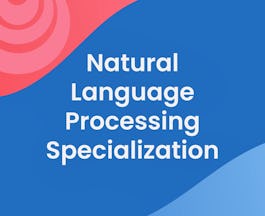
DeepLearning.AI
Natural Language Processing
Skills you'll gain : Machine Learning, Natural Language Processing, Python Programming, Statistical Programming, Artificial Neural Networks, Probability & Statistics, Statistical Machine Learning, Deep Learning, Machine Learning Algorithms, Applied Machine Learning, Computer Programming, Human Learning, Mathematics
(5.7K reviews)
Intermediate · Specialization · 3 - 6 Months

Introduction to Public Speaking
Skills you'll gain : Communication, Critical Thinking, Decision Making, Human Learning, Problem Solving, Process Analysis, Strategy, Business Communication, Planning, Public Relations, Writing
(2K reviews)
Beginner · Course · 1 - 3 Months

Shanghai Jiao Tong University
Training and Practicing in English Public Speaking
(207 reviews)

University of California, Irvine
The Pronunciation of American English
(1K reviews)

Speaking to Inspire: Ceremonial and Motivational Speeches
Skills you'll gain : Storytelling, Critical Thinking, Public Relations, Emotional Intelligence, Organizational Development, People Development, Writing
(148 reviews)

Peking University
Essentials for English Speeches and Presentations 英语演讲与演示
(143 reviews)
Mixed · Course · 1 - 3 Months

Discover Acting
Skills you'll gain : Training
(35 reviews)

University of Pennsylvania
English for Career Development
Skills you'll gain : Business Communication, Critical Thinking, Human Resources, Human Resources Operations, Application Development, People Analysis
(15K reviews)

Verbal Communications and Presentation Skills
(19 reviews)
Searches related to speech
In summary, here are 10 of our most popular speech courses.
- Finding Your Professional Voice: Confidence & Impact : University of London
- Dynamic Public Speaking : University of Washington
- Fundamentals of Speechwriting : Coursera Instructor Network
- Natural Language Processing : DeepLearning.AI
- Introduction to Public Speaking : University of Washington
- Training and Practicing in English Public Speaking : Shanghai Jiao Tong University
- The Pronunciation of American English : University of California, Irvine
- Speaking to Inspire: Ceremonial and Motivational Speeches : University of Washington
- Essentials for English Speeches and Presentations 英语演讲与演示 : Peking University
- Discover Acting : University of London
Frequently Asked Questions about Speech
What is speech .
Speech is the vocalized form of human communication. It involves the production of sound through the articulation of words and sounds using the vocal organs like the tongue, lips, vocal cords, and lungs. Speech allows individuals to express their thoughts, ideas, and emotions, and is an essential mode of communication in various settings such as conversations, presentations, and public speaking. It plays a crucial role in language development, social interaction, and overall human interaction.
What skills do I need to learn for Speech?
To excel in the field of speech, there are several skills that are beneficial to acquire:
Public Speaking: Developing effective communication and presentation skills is essential for delivering impactful speeches.
Verbal and Non-verbal Communication: Understanding how to convey messages using both spoken words and body language can significantly enhance your speech delivery.
Active Listening: Being able to attentively listen and understand the perspectives of others is crucial for effective speechmaking.
Voice Modulation: Mastering techniques to vary the tone, pitch, and volume of your voice can help capture the attention of your audience and effectively convey emotions.
Storytelling: Learning the art of storytelling can make your speeches more engaging and memorable.
Persuasion and Influence: Acquiring the skills to persuasively present ideas, influence others, and inspire action can greatly enhance the impact of your speeches.
Research and Analysis: Developing the ability to gather and assess information to support your arguments and deliver well-informed speeches.
Time Management: Being able to organize and structure your speech effectively within a given timeframe is an essential skill for public speaking.
Confidence Building: Building self-confidence and managing stage fright are vital for delivering impactful speeches.
- Adaptability: Being able to adapt your speech delivery style to different audiences and situations is crucial for effective communication.
Remember, practice and continuous learning are key to mastering these skills and becoming an effective speaker.
What kinds of jobs can you get with Speech skills?
There are several jobs that require strong speech skills. Some of them include:
Public Speaking: With speech skills, you can become a professional public speaker, delivering presentations, speeches, or seminars.
Voice-over Artist: Many industries require talented voice-over artists for various purposes like commercials, audiobooks, animated films, and video games.
Broadcast Journalist: Speech skills are crucial for broadcast journalists who report news and present stories on television or radio.
Interpreter or Translator: If you possess language fluency, your speech skills can be valuable as an interpreter or translator, enabling effective communication between people who speak different languages.
Sales Representative: Excellent speech skills are essential for sales representatives as they need to articulate product or service benefits persuasively.
Communication Trainer: With good speech skills, you can become a communication trainer, coaching individuals or organizations to improve their speaking abilities.
Customer Support Representative: Strong speech skills are appreciated in customer support roles, where you need to confidently communicate with customers to address their queries or concerns.
Language Teacher: If you have expertise in a specific language, you can teach it using your speech skills, either as a private tutor or in schools and language centers.
Radio Jockey or Podcast Host: Speech skills are vital for those working in radio or podcasting industries, where they engage listeners through their verbal communication skills.
- Actor or Public Performer: Having impeccable speech skills can open doors to acting roles in theaters, movies, or TV shows, where expressive and persuasive speech is essential.
These are just a few examples of the diversified career options available to individuals with speech skills.
What kind of people are best suited for studying Speech?
People who are interested in communication, public speaking, and language skills are best suited for studying Speech. Additionally, individuals who aspire to become effective communicators, presenters, or leaders in various fields can benefit greatly from studying Speech. This field of study is also suitable for those who want to improve their interpersonal skills, build confidence in public speaking, or pursue careers in areas such as broadcasting, journalism, politics, or teaching.
What topics can I study that are related to Speech?
Public Speaking: Learn techniques and strategies to communicate confidently and effectively in front of an audience. Build skills in speech delivery, body language, vocal variety, and speech organization.
Speech Writing: Study the art of crafting compelling speeches. Learn how to structure speeches, write persuasive narratives, and engage listeners with impactful language.
Rhetoric and Persuasion: Dive deeper into the principles of effective persuasion and rhetoric. Explore classical and modern rhetorical techniques, analyze persuasive speeches, and develop your own persuasive abilities.
Intercultural Communication: Gain insights into the challenges and nuances of communicating across cultural boundaries. Study cultural differences in speech patterns, nonverbal communication, and societal norms to enhance your cross-cultural interactions.
Debate and Argumentation: Hone your critical thinking and argumentative skills by studying debate techniques. Learn how to construct compelling arguments, anticipate counterarguments, and engage in constructive debates.
Voice and Diction: Focus on refining your vocal skills and diction to enhance your speech delivery. Develop proper breathing techniques, vocal resonance, and articulation to improve enunciation and overall speech clarity.
Speech Therapy and Communication Disorders: Explore the field of speech therapy and communication disorders. Study the anatomy and physiology of speech, learn about speech disorders, and understand therapeutic techniques used to treat them.
Phonetics and Phonology: Delve into the study of speech sounds and their production, perception, and classification. Understand phonetic symbols, phonological processes, and how they contribute to language development.
Nonverbal Communication: Learn about the importance of nonverbal cues in communication. Study body language, facial expressions, gestures, and other nonverbal signals to better understand and interpret the messages conveyed through nonverbal means.
Interpersonal Communication: Develop effective interpersonal communication skills by studying different communication styles, techniques for active listening, conflict resolution strategies, and building positive relationships in various contexts.
Presentation Skills: Master the art of delivering engaging presentations. Learn about effective visual aids, slide design, audience engagement techniques, and using technology to enhance your presentation delivery.
- Speech Science: Gain an understanding of the scientific principles behind speech production, perception, and acoustics. Study the mechanisms of the vocal apparatus, speech disorders, and the physics of sound as related to speech.
What are the benefits of taking an online Speech course?
Online Speech courses offer a convenient and flexible way to enhance your knowledge or learn new Speech is the vocalized form of human communication. It involves the production of sound through the articulation of words and sounds using the vocal organs like the tongue, lips, vocal cords, and lungs. Speech allows individuals to express their thoughts, ideas, and emotions, and is an essential mode of communication in various settings such as conversations, presentations, and public speaking. It plays a crucial role in language development, social interaction, and overall human interaction. skills. Choose from a wide range of Speech courses offered by top universities and industry leaders tailored to various skill levels.
What Speech courses are best for training and upskilling employees or the workforce?
When looking to enhance your workforce's skills in Speech, it's crucial to select a course that aligns with their current abilities and learning objectives. Our Skills Dashboard is an invaluable tool for identifying skill gaps and choosing the most appropriate course for effective upskilling. For a comprehensive understanding of how our courses can benefit your employees, explore the enterprise solutions we offer. Discover more about our tailored programs at Coursera for Business here .
Other topics to explore

Recommended
Breaking news, columbia university faces calls for tuition refunds as school moves to hybrid classes for rest of term in wake of anti-israel protests.
- View Author Archive
- Email the Author
- Get author RSS feed
Contact The Author
Thanks for contacting us. We've received your submission.
Thanks for contacting us. We've received your submission.
Columbia University has announced that classes at its main campus will be held remotely for the final weeks of the semester — as critics blasted the “weak” administration for allowing anti-Israel student protesters to shut down the college “in essence” and called on parents to seek tuition refunds.
“It’s vital that teaching and learning continue during this time. We recognize conditions vary across our campuses and thus are issuing the following guidelines,” provost Angela Olinto wrote in a Monday night notice to students and faculty as the anti-Israel encampment on campus neared the seven-day mark.
Classes on the university’s Morningside Heights campus will be hybrid — “technology permitting” — through the end of the spring 2024 semester on April 29, the letter said.
Faculty without the means to provide hybrid classes were urged to consider the fully remote option, and to “provide other accommodations liberally” in the final days of the semester.

“Safety is our highest priority as we strive to support our students’ learning and all the required academic operations,” Olinto wrote.
Those on campus, however, said the move was disappointing.
Junior Michael D’Agostino, 22, said the hybrid classes were frustrating given “the amount we pay to be at this school to learn from these amazing faculties and professors.”
“I’m studying applied physics and applied math and those are classes I really benefit from being in-person. I went through COVID and all that when we were online for about a year and it really disrupted our education,” he added.
“I really think it’s disheartening to see how our education is being punished as a result of this,” he said of the school’s response to the protests. “I think it’s really sad.”
Former White House press secretary Ari Fleischer slammed the decision to move to hybrid classes for the end of the semester, writing that “’protesters’ have in essence shut down Columbia University.”
“It’s terrible how weak the school’s leaders – and especially its faculty – are,” Fleischer wrote on X . “The school should be fully open (no remote classes) and students who disrupt other students should be expelled.”
Follow The Post’s coverage of the anti-Israel protests at Columbia University:
- Pro-terror radical launched 2-hour anti-Israel tirade at Columbia University event weeks before protests exploded: ‘Nothing wrong with being a Hamas fighter’
- Anti-Israel protesters urge others to break into ‘platoons’ as Columbia University extends deadline for them to leave
- House Speaker Mike Johnson demands ‘very weak, inept’ Columbia prez Minouche Shafik resign ahead of campus visit
- Rep. Elise Stefanik demands federal funds for Columbia University be revoked in wake of anti-Israel protests
Meanwhile, former Arkansas Gov. Mike Huckabee slammed the university for allowing the anti-Israel protesters “to roam around spewing genocidal chants.”
“If a parent has a child at Columbia, they should demand a refund and then sue for breach of contract,” Huckabee wrote on X .
Classes at Barnard College, the historically women’s college affiliated with Columbia, are still in-person, the Columbia Daily Spectator noted .
Israel War Update
Get the most important developments in the region, globally and locally.
Thanks for signing up!
Please provide a valid email address.
By clicking above you agree to the Terms of Use and Privacy Policy .
Never miss a story.
Columbia and Barnard held remote classes on Monday to “de-escalate the rancor” on campus, university president Manouche Shafik announced early that day .
“I am deeply saddened by what is happening on our campus. Our bonds as a community have been severely tested in ways that will take a great deal of time and effort to reaffirm,” Shafik wrote.
Meanwhile, the college appeared to be beefing up security on its main campus.

One security guard said the university’s contractor, Apex Security Group Inc., was recruiting more workers for its 7 p.m.-to-7 a.m. shift at a rate of $240 a day.
“It’s my first day. We need it,” the worker told The Post.
Columbia became the nexus of pro-Palestinian efforts on campuses across the country last Wednesday, when a tent encampment emerged on one of the lawns in front of Butler Library.
Jewish students reported feeling unsafe due to the antisemitic language of some of the protesters and their supporters who gathered outside the campus gates.

“We’re all Hamas … Long live Hamas!” one off-campus agitator could be heard yelling in a video posted on X by the watchdog Stop Antisemitism .
On Thursday, Shafik took the extraordinary step of requesting the NYPD enter the campus and break up the protest, which resulted in the arrest of over 100 participants .
The move immediately drew backlash from the pro-Palestinian students’ supporters and faculty members — while others insisted that the university is still not doing enough to protect Jewish students from harassment and harm.
Antisemitism controversy at Columbia University: Key events
- Columbia University president Minouche Shafik was accused of “gross negligence” while testifying before Congress. Shafik refused to say if the phrase “From the river to the sea, Palestine will be free” is antisemitic.
- More than 100 Columbia professors signed a letter defending students who support the “military action” by Hamas.
- Antisemitic posters depicting Israel as a skunk appeared on campus — which experts liken to a propaganda poster used by the Nazis in World War II.
- Radical anti-Israel activists Charlotte Kates and Khaled Barakat told Columbia students a two-hour tirade , “There is nothing wrong with being a fighter in Hamas” in a seminar called “Resistance 101″ — weeks before the campus exploded in pro-Palestinian protests.
- Columbia students erected 60 tents on campus to demand that the university divest from Israel.
- More than 100 other protesters were arrested after Shafik announced the campus’s closure.
- Israel-born professor Shai Davidai was barred from campus after he attempted to lead a pro-Jewish rally.
- Every New York House GOP lawmaker demanded that Shafik resign immediately .
- Columbia University’s Jewish Alumni Association also called for Shafik’s resignation .
The arrests also sparked a series of similar encampments at other universities, including Yale and NYU.
New York Gov. Kathy Hochul stopped by the Morningside Heights campus, where on Monday she met with university officials and the NYPD about the public safety crisis.
“The recent harassment and rhetoric is vile and abhorrent. Every student deserves to be safe,” she shared on X .

Also on Monday, New England Patriots owner Robert Kraft announced his bombshell decision to withhold donations from the school due to the recent unrest.
One of Kraft’s many past contributions to his alma mater was the Kraft Center for Jewish Life, home to Columbia and Barnard’s Hillel.
Share this article:

Advertisement

IMAGES
VIDEO
COMMENTS
Online classes have both advantages and disadvantages. On the one hand, online classes allow students and teachers to follow the COVID protocols. On the other hand, spending hours on the phone is increasing the chance of students getting hooked to their phones scrolling through various social media applications. Speech on Online Classes: Since ...
10-Line Speech on Online Education. The process of acquiring education using the internet is known as online education. It is a modern method of gaining an education. The concept of online education existed a few years back. It saves time and money for students. It offers a variety of courses to the students at their homes.
There is 1 module in this course. Fundamentals of Speechwriting is a course that enhances speechwriting skills by deepening learners' understanding of the impact of key elements on developing coherent and impactful speeches. It is aimed at learners with experience writing and speaking who wish to enhance their current skills.
Quotes of some internationally famous personalities for Speech on Online education. "Education is the most powerful weapon which you can use to change the world.". "One child, one teacher, one book, one pen can change the world.". "The internet is becoming the town square for the global village of tomorrow.".
Here are a few of them: Schools can save on various costs, including electricity and maintenance, as the need for physical classrooms is reduced. Online classes eliminate the need for commuting, saving both students and teachers time and money. Online education can be a cost-effective option for students who cannot afford high tuition fees.
Introduction to Public Speaking. This course is part of Dynamic Public Speaking Specialization. Taught in English. 22 languages available. Some content may not be translated. Instructor: Dr. Matt McGarrity. Enroll for Free. Starts Apr 21. Financial aid available.
Learn Public Speaking Online. Elevate your oratory skills with our public speaking courses, designed for anyone looking to become a more confident and effective communicator. Developed by top universities and industry leaders, our courses cover a range of critical areas, including speech writing, delivery techniques, audience engagement, and ...
Conveying a convincing message can benefit your personal, public, and professional lives. This course is an introduction to the theory and practice of rhetoric, the art of persuasive writing and speech. In it, you will learn to construct and defend compelling arguments, a crucial skill in many settings. We will be using selected speeches from ...
This course aims to make you excel where others stumble. We'll explore how to structure speeches coherently, write memorably, and present confidently. Upon completion, you will diminish your public speaking anxiety, leverage rehearsal methods to develop a robust, engaging speaking voice, and execute speeches with dynamic movements.
A unique feature of this course is that you can practice everything you've learned, either online or in VR: Unlock access to interactive exercises, which you can access from your web browser or a VR headset. Mock conference rooms, meeting rooms, Zoom presentations, and more. Practice your skills with various audience sizes.
From politicians to priests, people in any career can benefit from strong public speaking skills. And, it's a skill that can be used both professionally and personally. Explore online public speaking and other self-development courses with edX. Explore online public speaking courses and develop the skills to advance your career with edX.
Writing and Delivering Speeches. With Daisy Lovelace Liked by 1,144 users. Duration: 40m Skill level: General Released: 4/13/2021. Start my 1-month free trial. Buy this course ($34.99*)
present and brand yourself as a professional. explain concepts in a way everyone can understand. apply different strategies of writing. apply important principles of good writing. leave the desired impression on your audience. motivate your audience. convince your audience to take action. finish your speech in a way everyone will remember.
Fundamentals of Speechwriting is a course that enhances speechwriting skills by deepening learners' understanding of the impact of key elements on developing coherent and impactful speeches. Explore a wide range of free and certified Speechwriting online courses. Find the best Speechwriting training programs and enhance your skills today!
A well-written and organized speech greatly reduces the anxiety around delivery, and can help win over audiences in a way the written word just can't match. In this course, Kelley School of ...
This ability will help you engage in civil discourse and make effective changes in society. Even outside the political sphere, conveying a convincing message can benefit you throughout your personal, public, and professional lives. This course is an introduction to the theory and practice of rhetoric, the art of persuasive writing and speech.
What makes a speech persuasive and memorable - and how do you write one? How can storytelling help political, corporate, nonprofit, and community leaders achieve their goals? What is the role of the speech in our politics, policymaking, and international relations? This course will explore the techniques speechwriters and speakers use, from research to rhetoric, to shape messages that move ...
Step 4: Deliver Your Speech. The next step in how to write a commencement speech is the easy part for some people—delivering your speech. Delivering an online graduation speech can be intimidating, even when you can't see your audience, so allow yourself plenty of time to practice. Follow these techniques used by great public speakers:
Speech Writing. This speech writing training course covers the art of creating memorable speeches. You will learn to create powerful and natural language fit for the speaker and occasion. Topics include planning, structure, flow, rhetoric, transitions and other key components. This course is available both live online and face-to-face.
Public Speaking and Presentations. This course is part of multiple programs. Taught in English. 2 languages available. Some content may not be translated. Instructor: CareerCatalyst. Enroll for Free. Starts Apr 22. Financial aid available.
The purpose of a speech is often to inform or persuade an audience. Speeches are usually written to be spoken directly to an audience and can be used to entertain, influencing the listeners that the viewpoint of the speaker is correct. Speeches can also be used to encourage the audience to take action or to change their behaviour in some way ...
Explore the best online doctoral programs in the U.S., including tuition rates, credit requirements, common courses and distance learning considerations.
Columbia University shifts classes remote after a wave of protests on campus. ... He additionally reiterated campus policies regarding free speech and the public's access to the campus, according ...
Mt. SAC has been ranked as the No. 1 Community College in California for 2024 by EdSmart.org. EdSmart formulates its rankings using data on degrees and certificates available, the costs of attending the college, and earning potential of alumni. At Mt. SAC, students can choose from over 400 degree and certificate programs. Online and in-person options are available to meet the academic ...
Columbia President Minouche Shafik said in a statement Monday that while online classes are being held, a working group of deans, university administrators and faculty members "will try to bring ...
Columbia University is at the center of a growing showdown over the war in Gaza and the limits of free speech. April 25, 2024. Share full article. 26. Hosted by Michael Barbaro.
There are a number of virtual programs available. The U.S. Department of the Interior, for example, has a page dedicated to everything it's doing to celebrate Take Your Child to Work Day. The page ...
Author Interviews Barbara Walters forged a path for women in journalism, but not without paying a price. Walters was the first woman to co-anchor a national news show on prime time television.
In summary, here are 10 of our most popular speech courses. Finding Your Professional Voice: Confidence & Impact: University of London. Dynamic Public Speaking: University of Washington. Natural Language Processing: DeepLearning.AI. Introduction to Public Speaking: University of Washington.
Former White House press secretary Ari Fleischer slammed the decision to move to hybrid classes for the end of the semester, writing that "'protesters' have in essence shut down Columbia ...